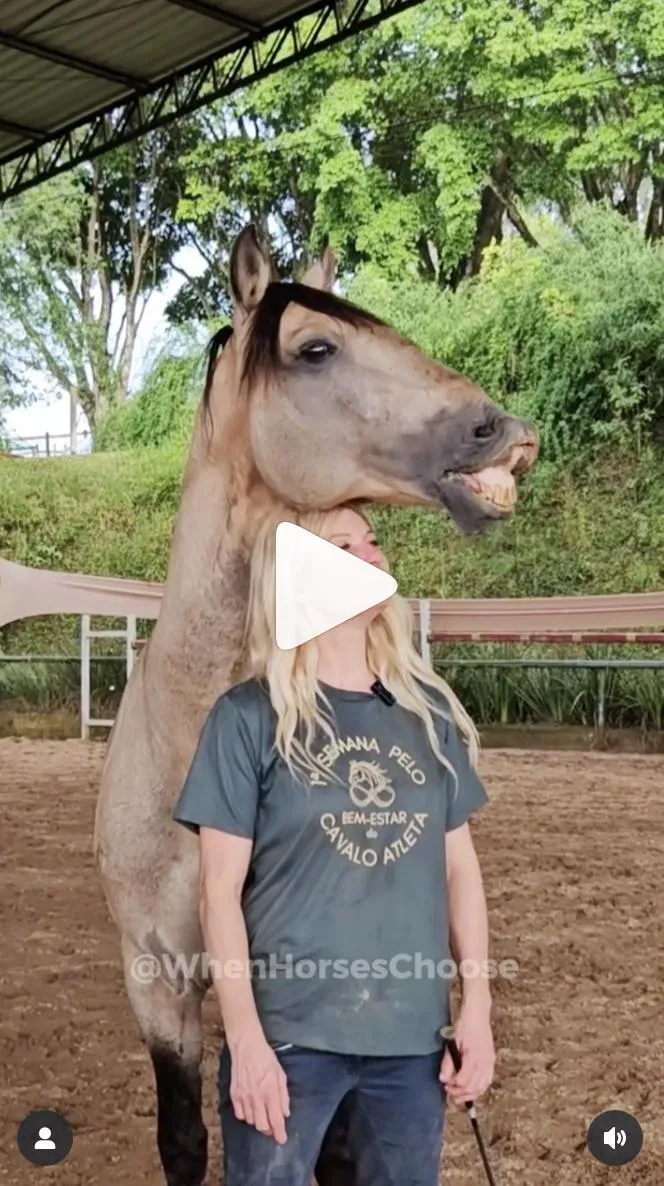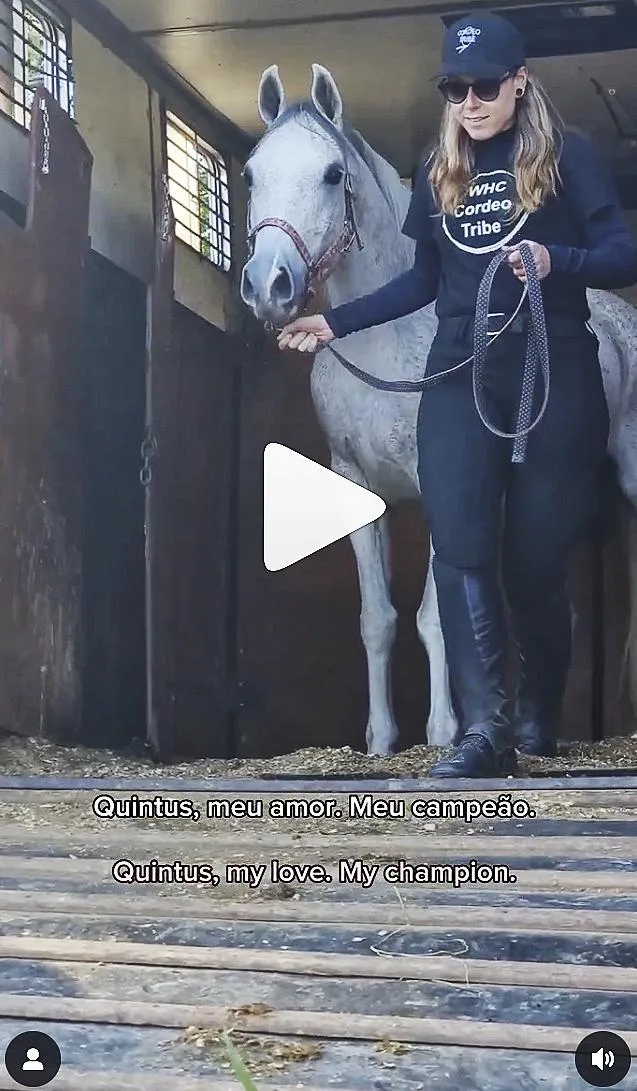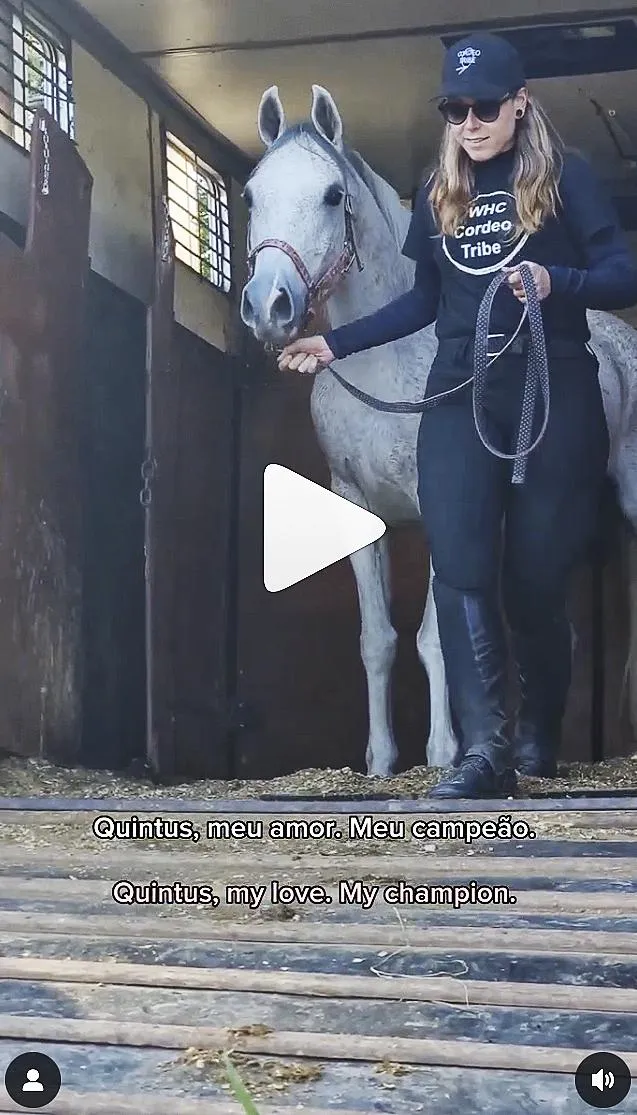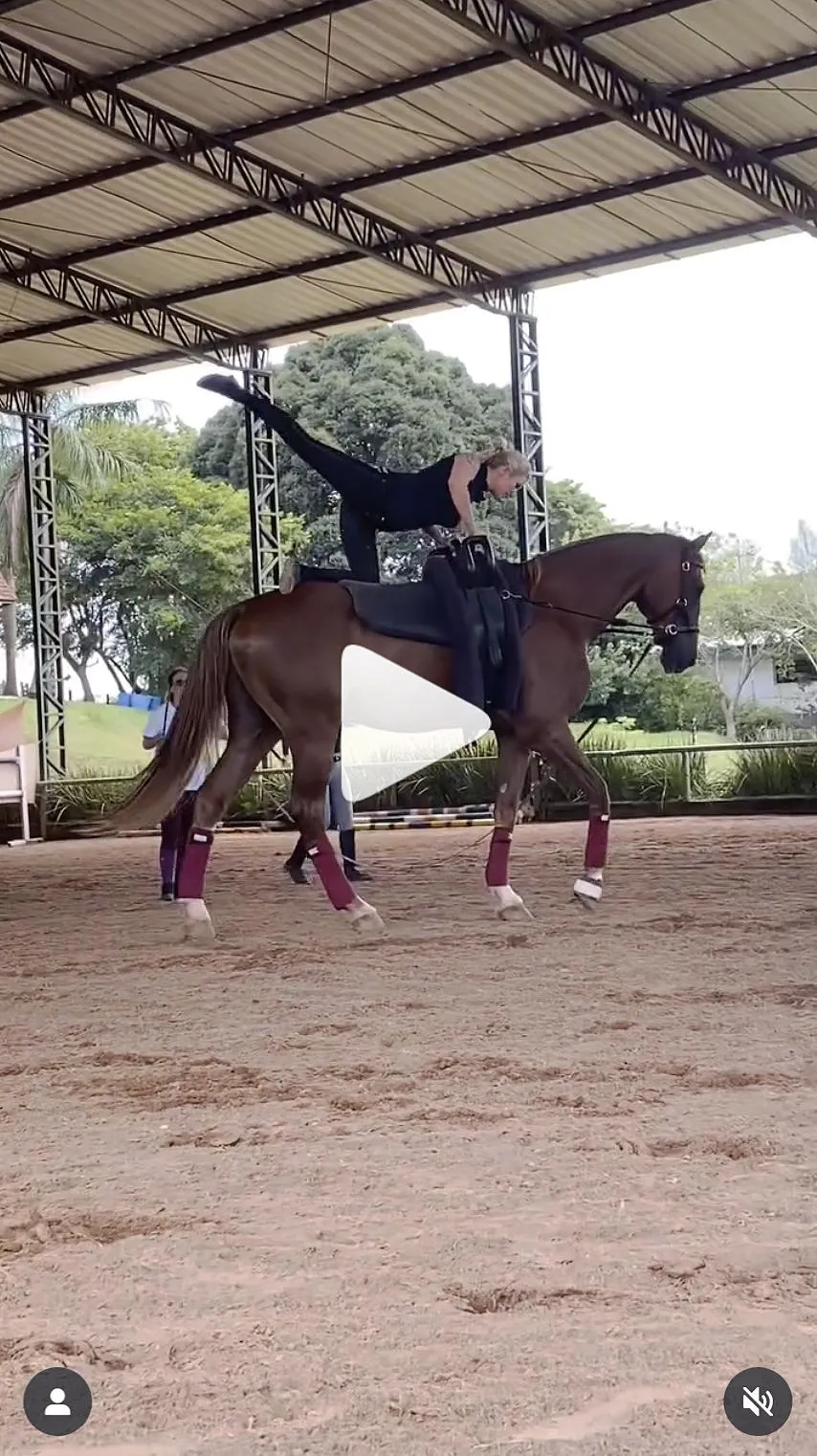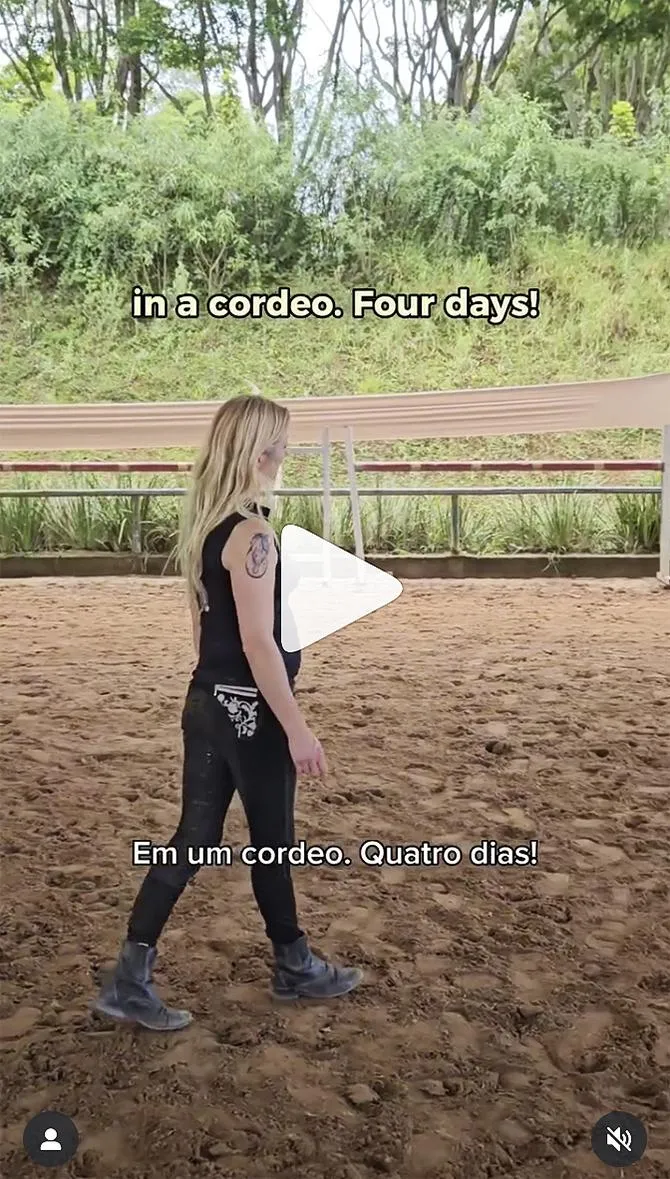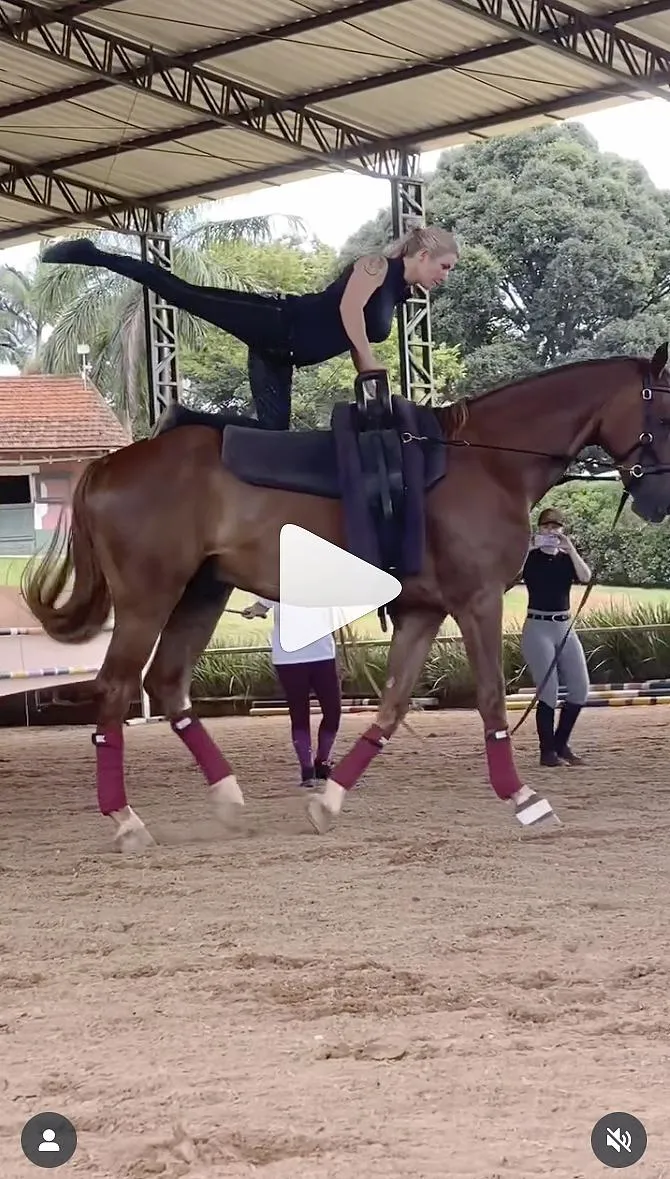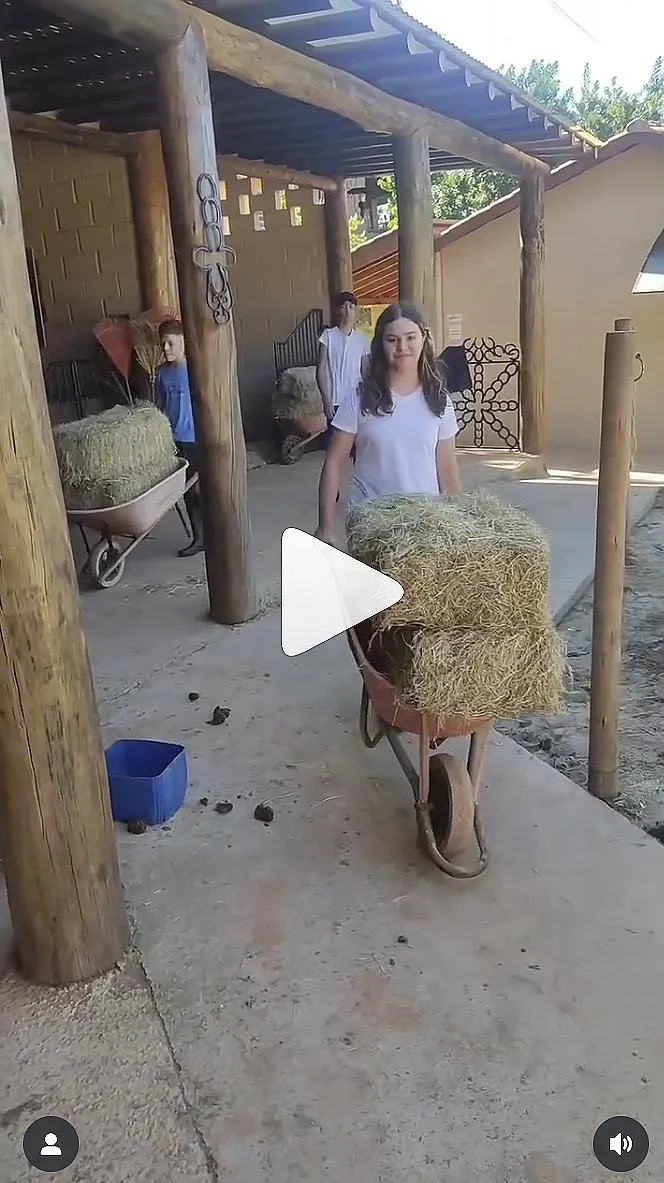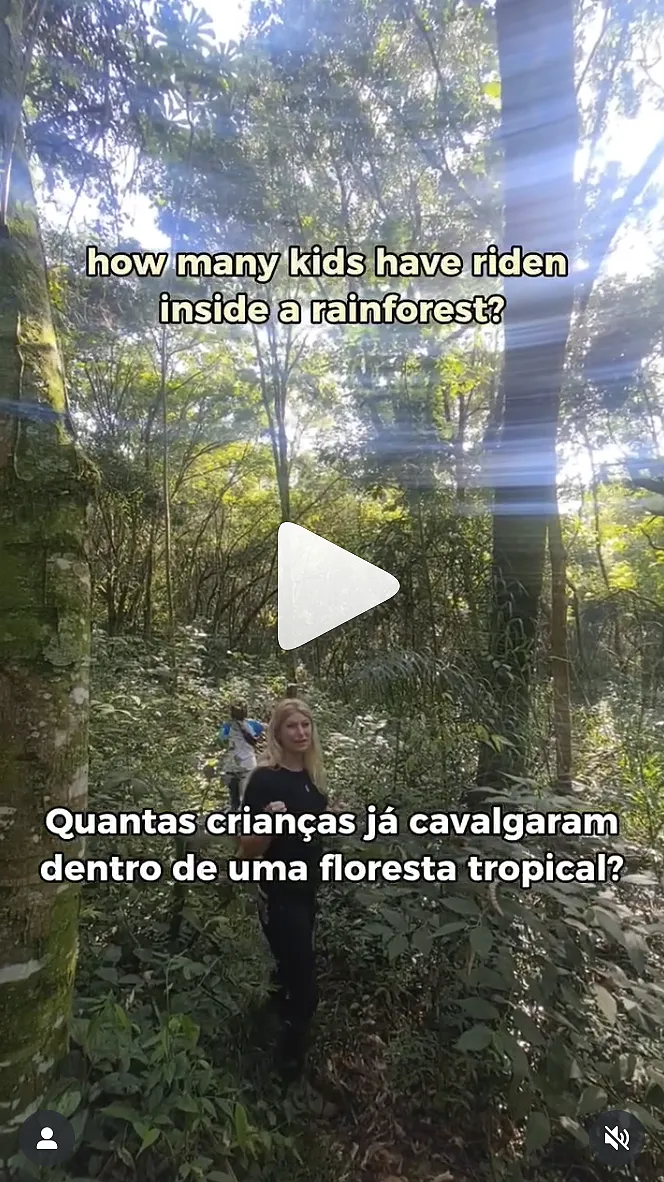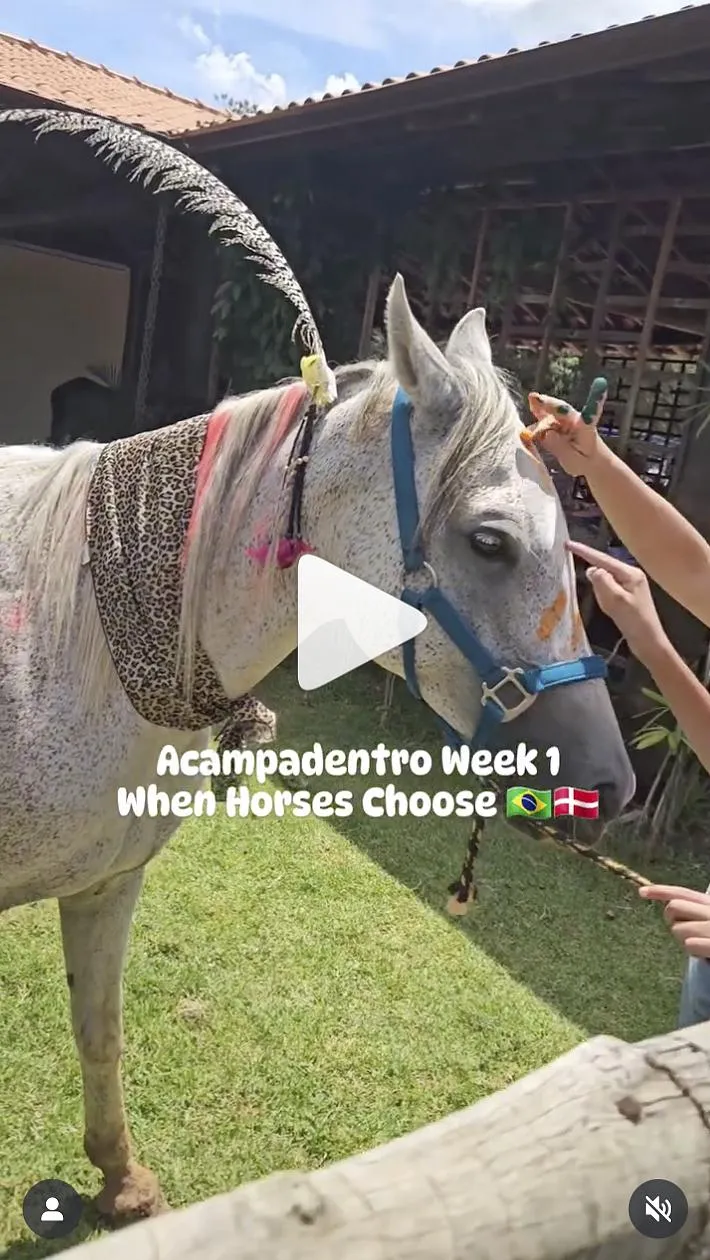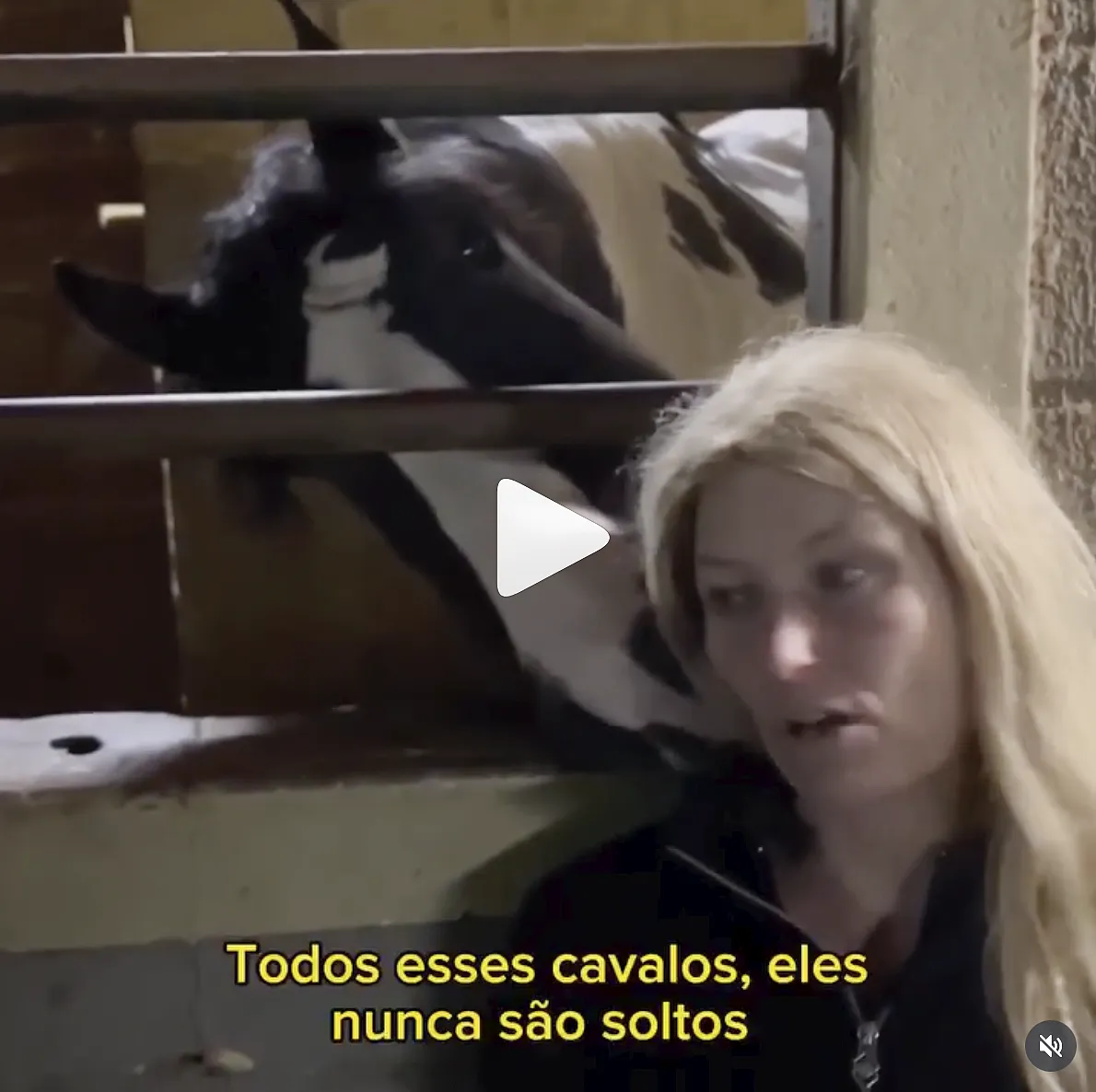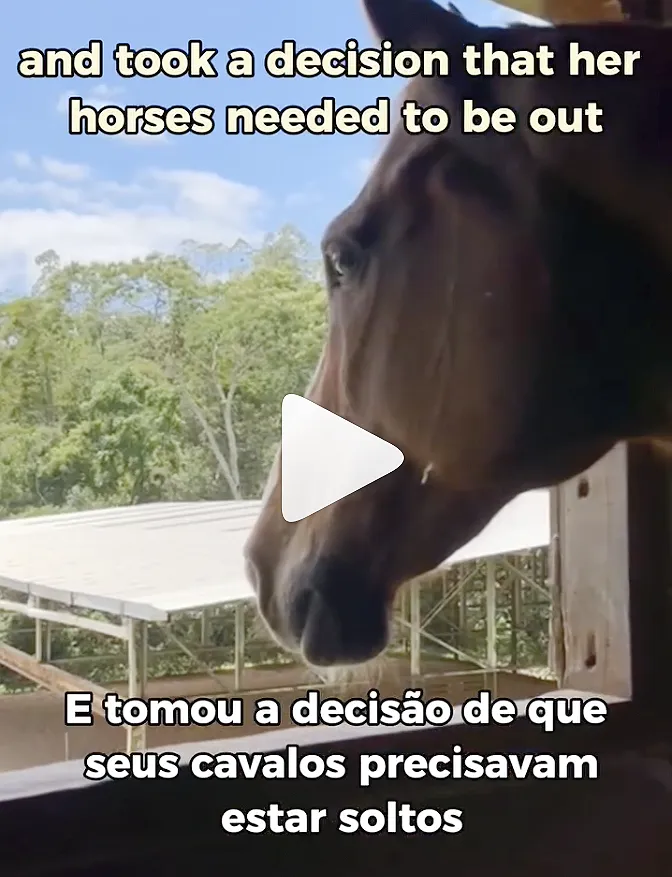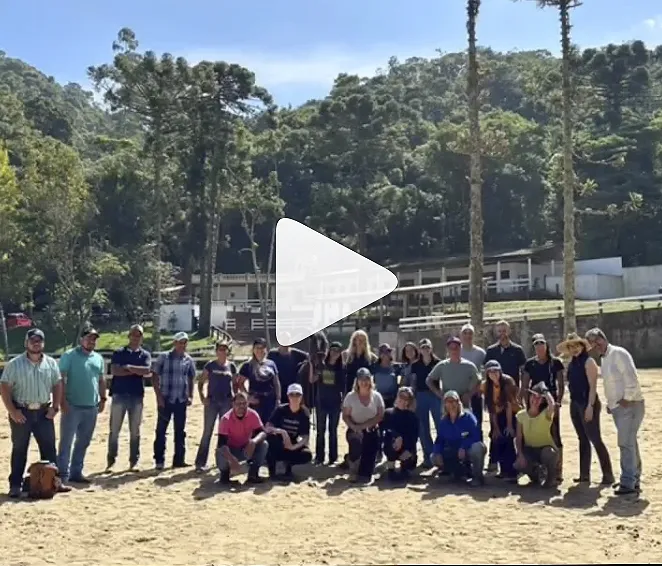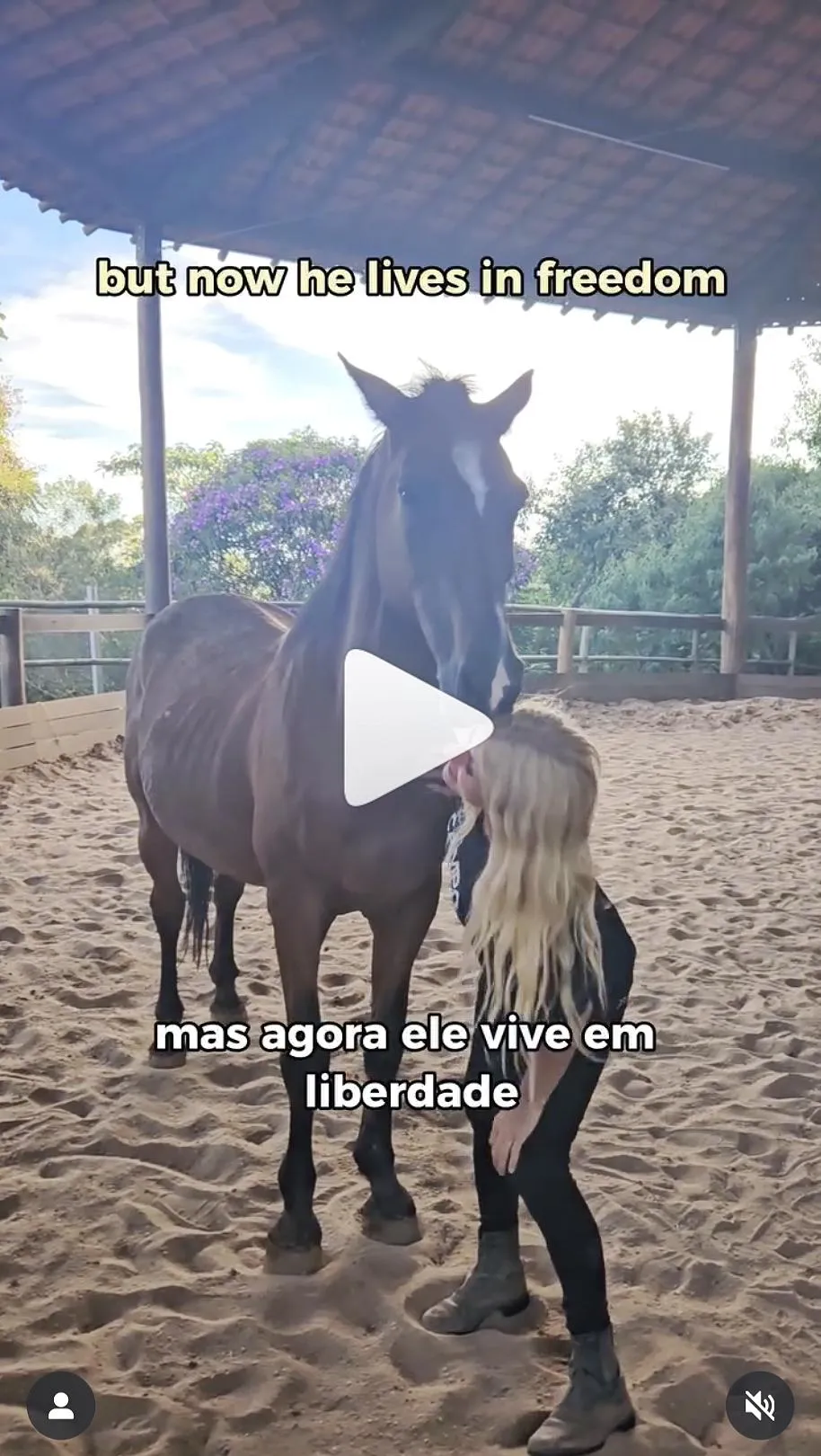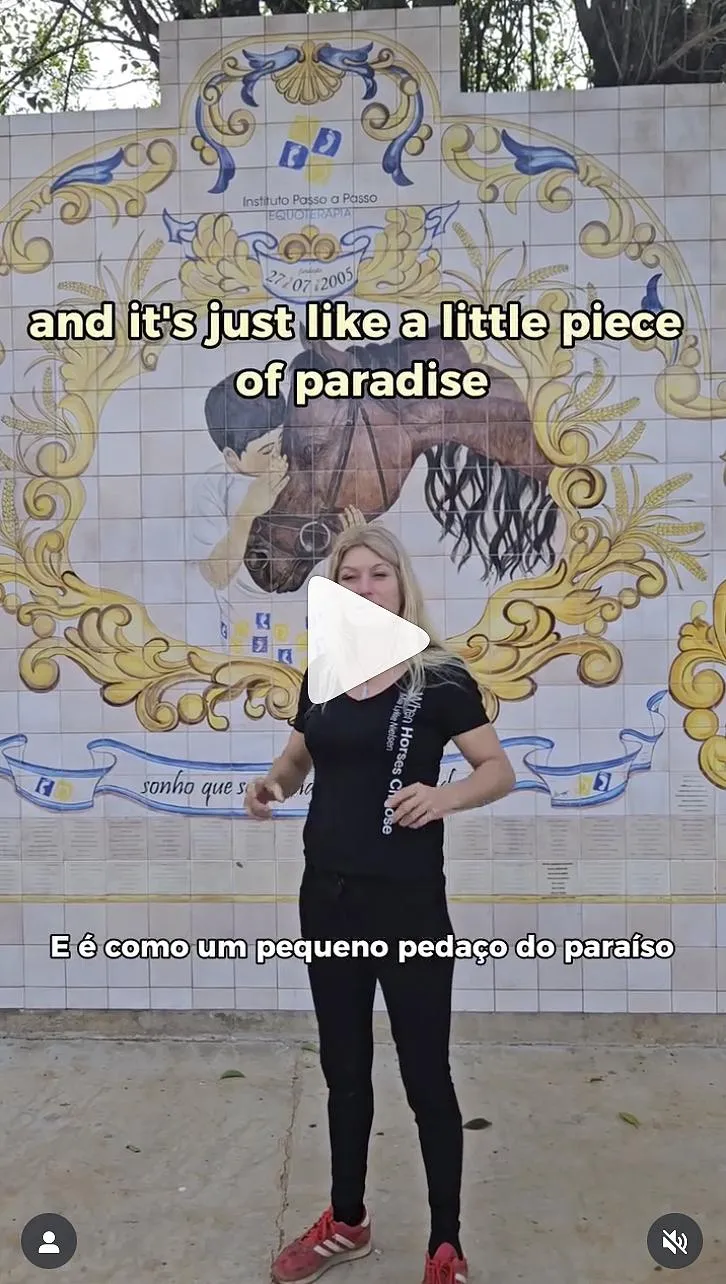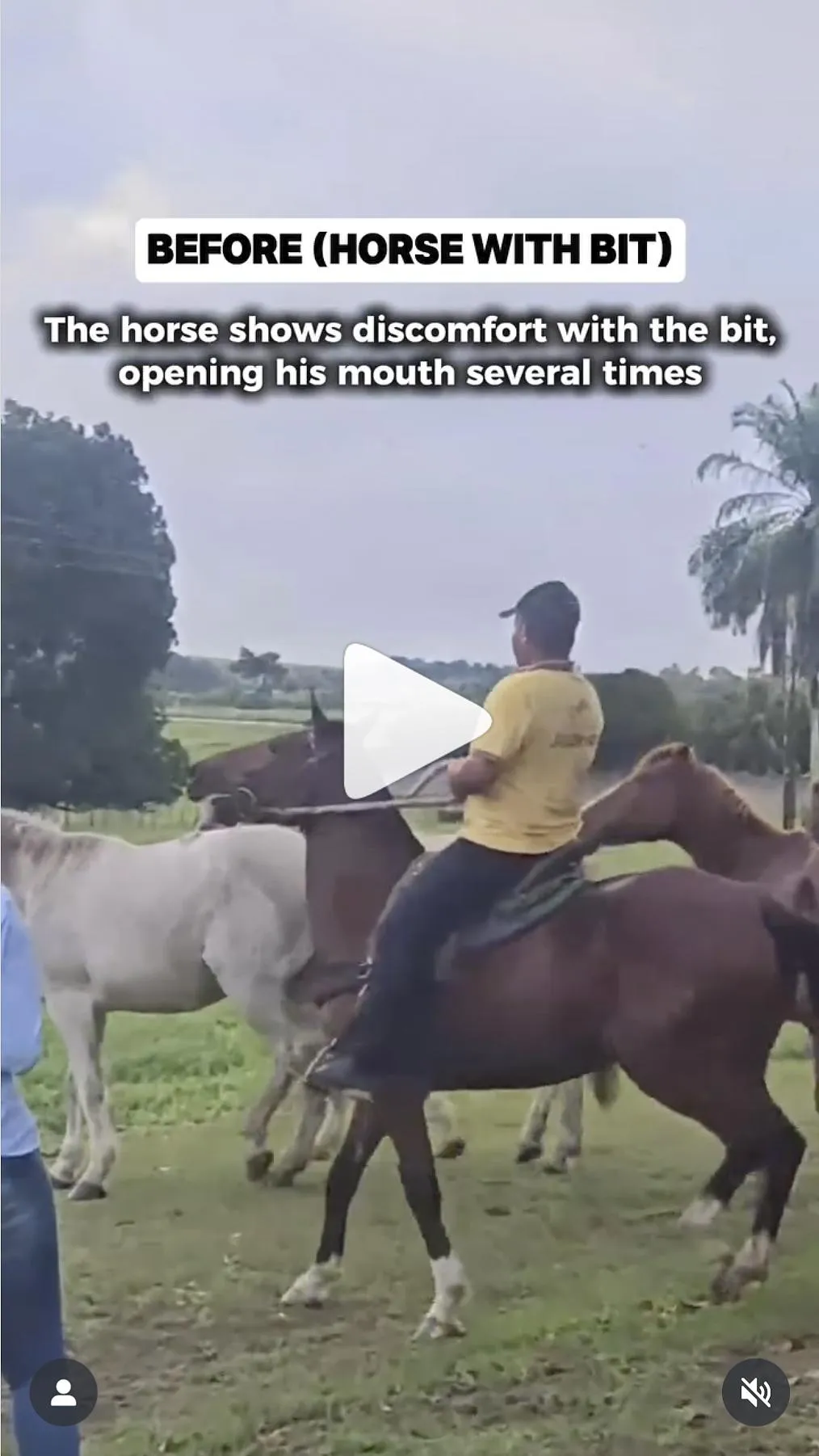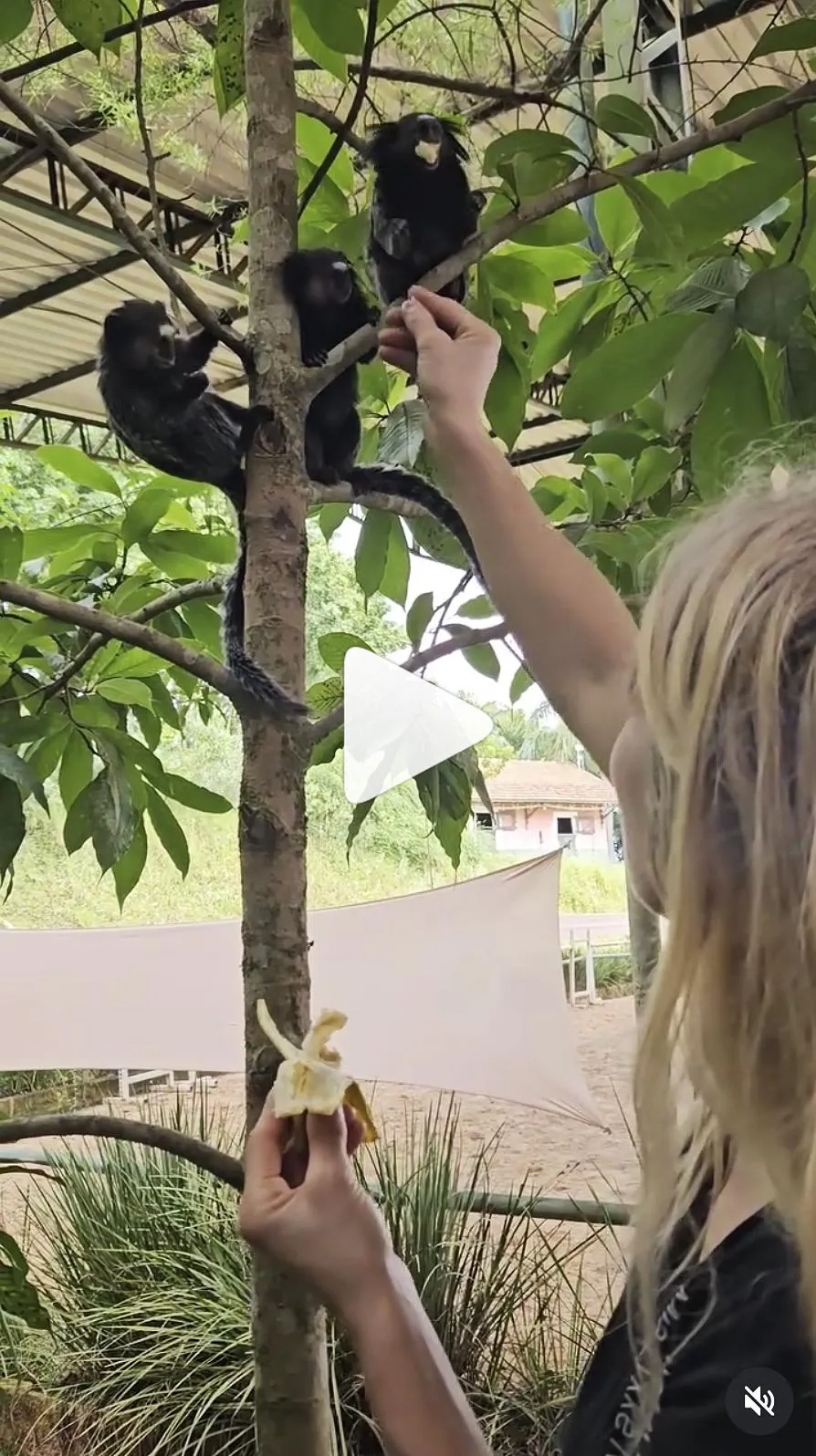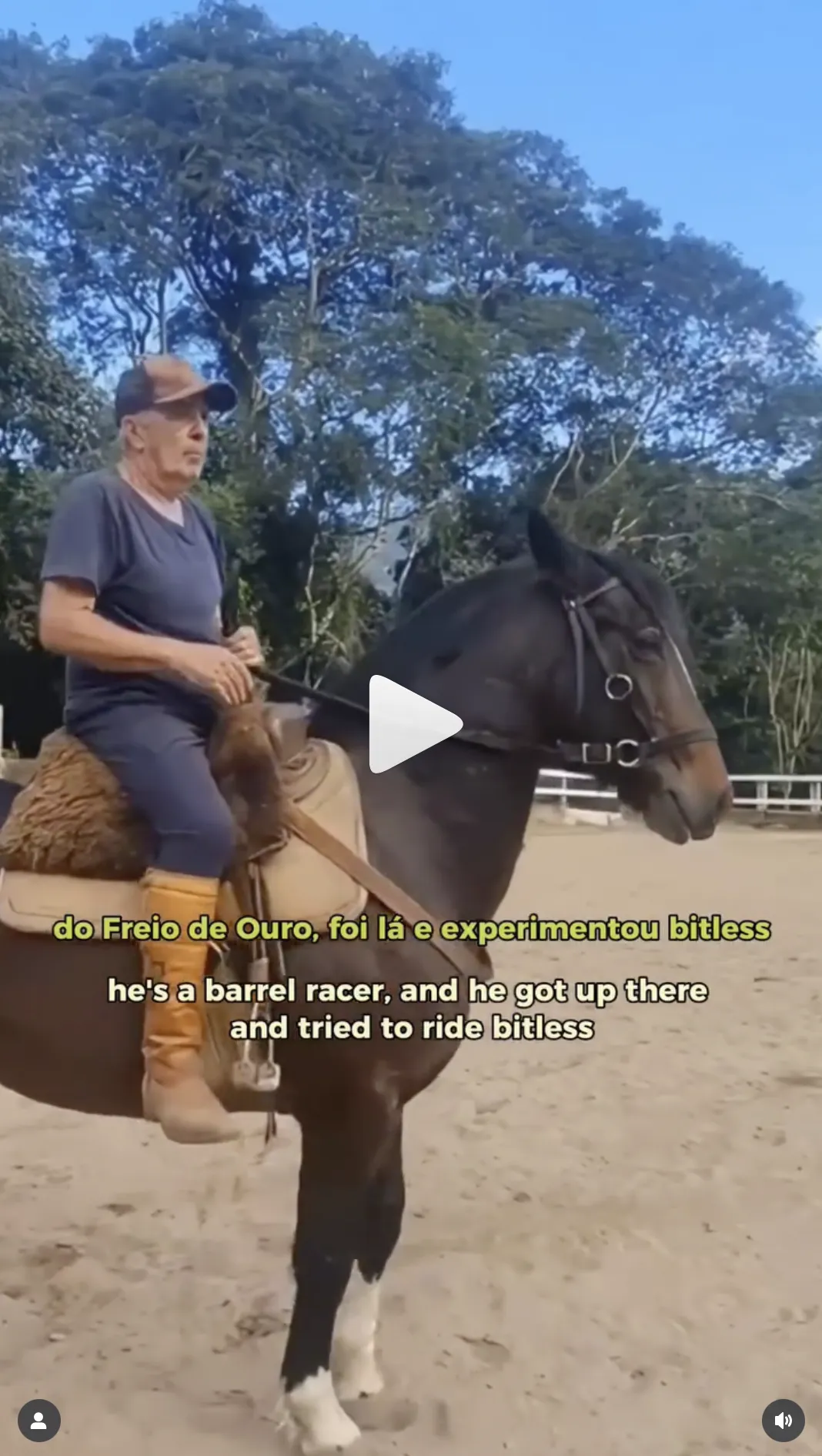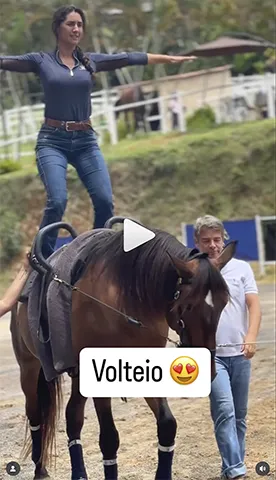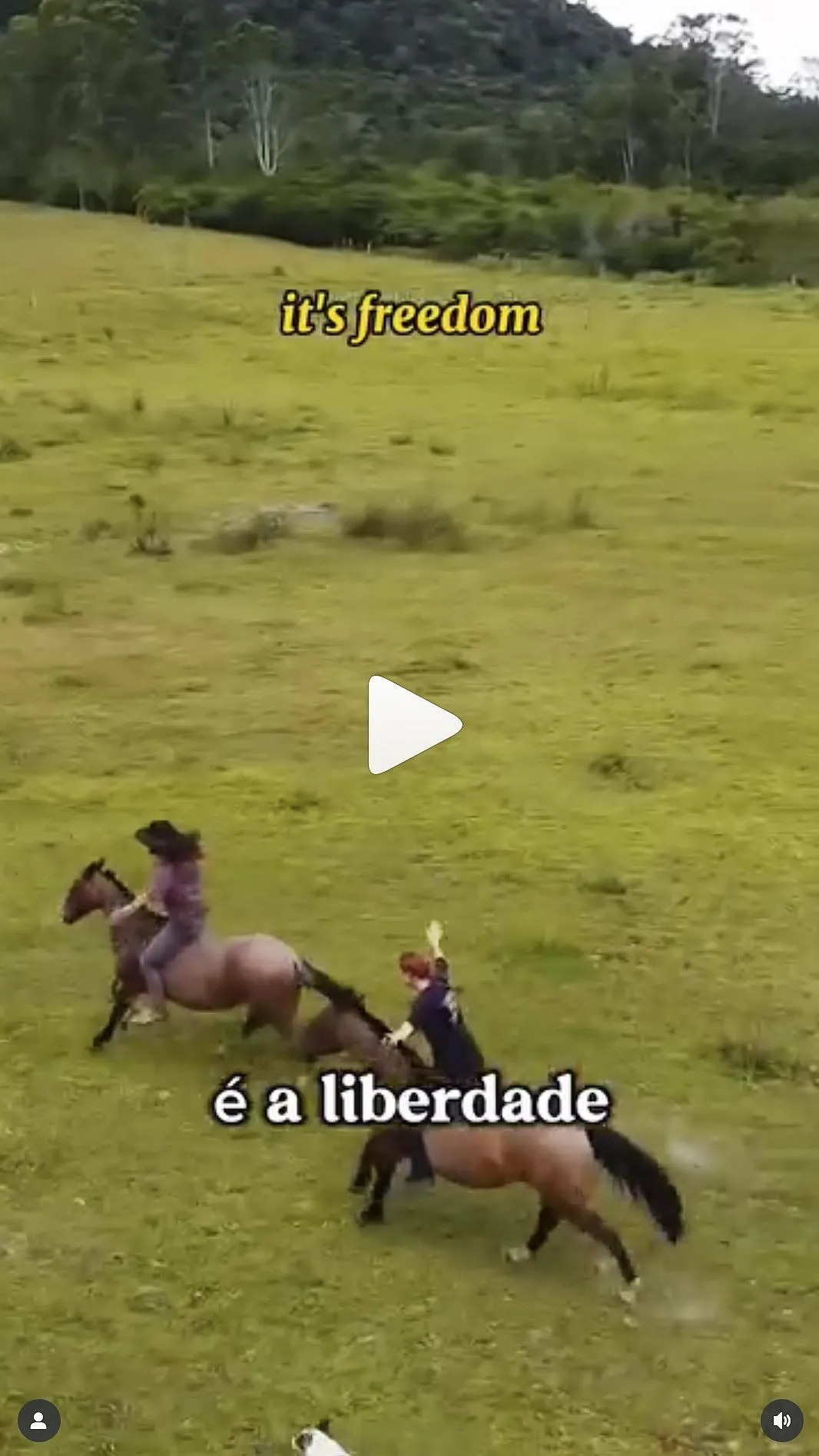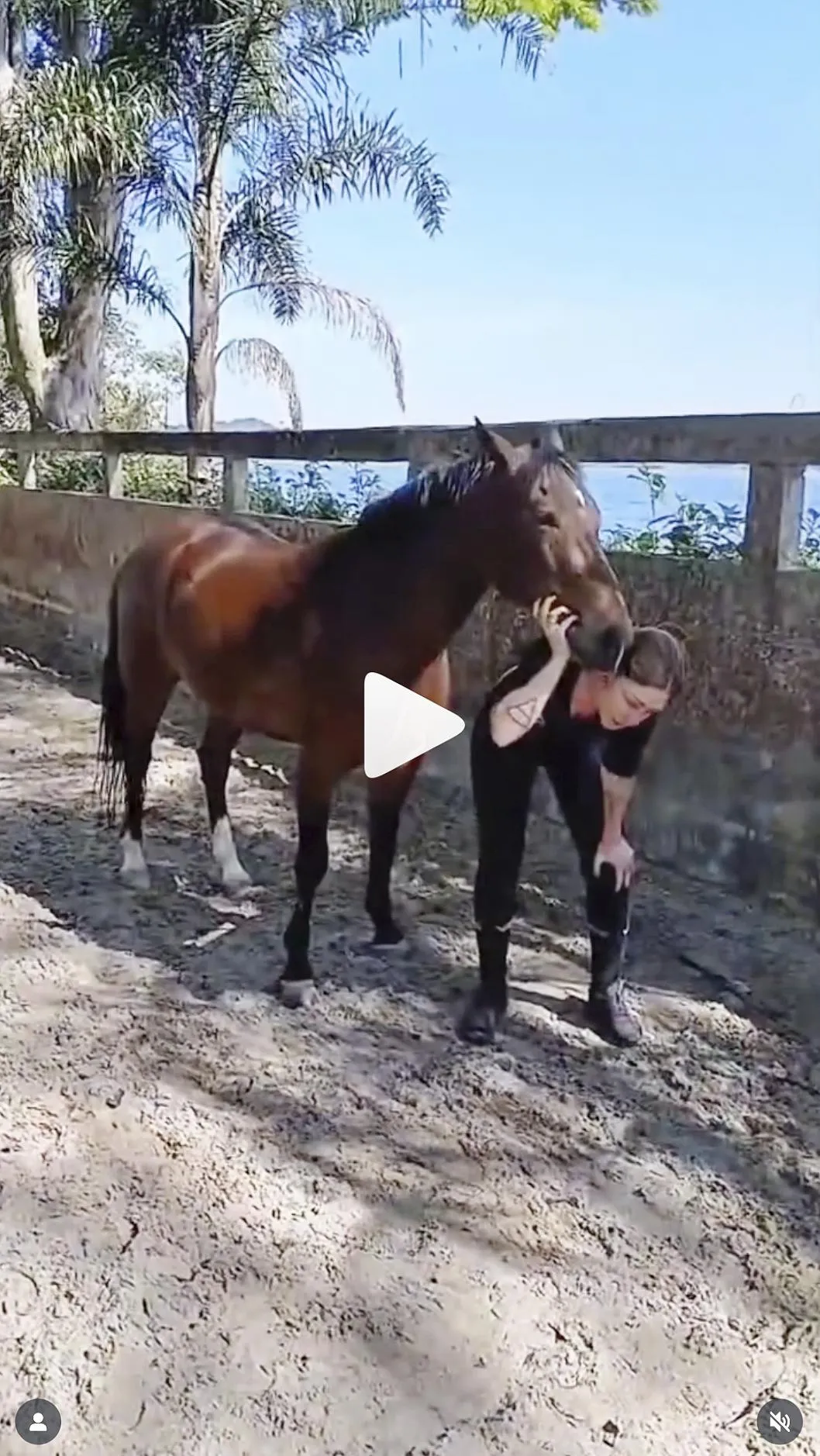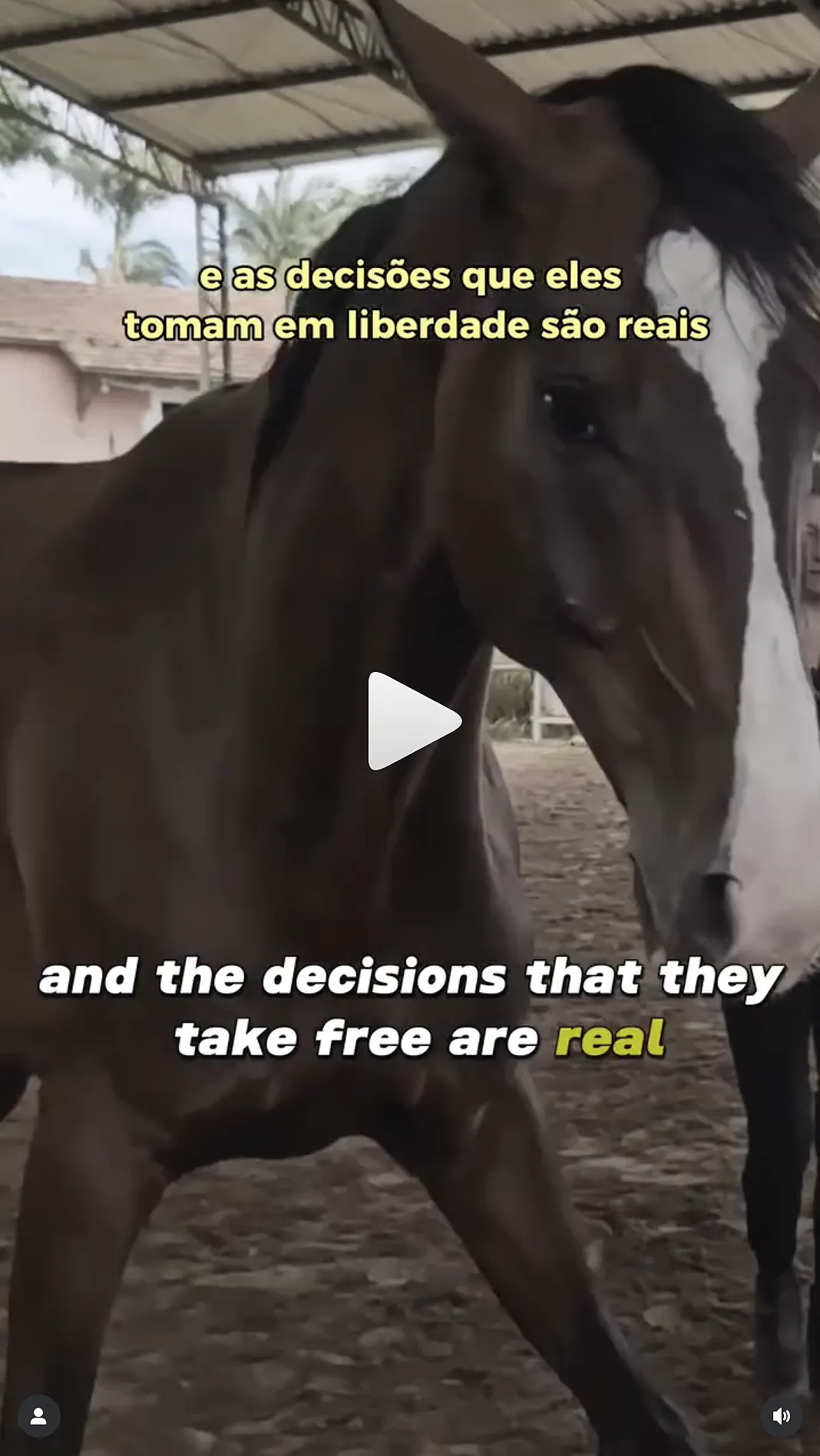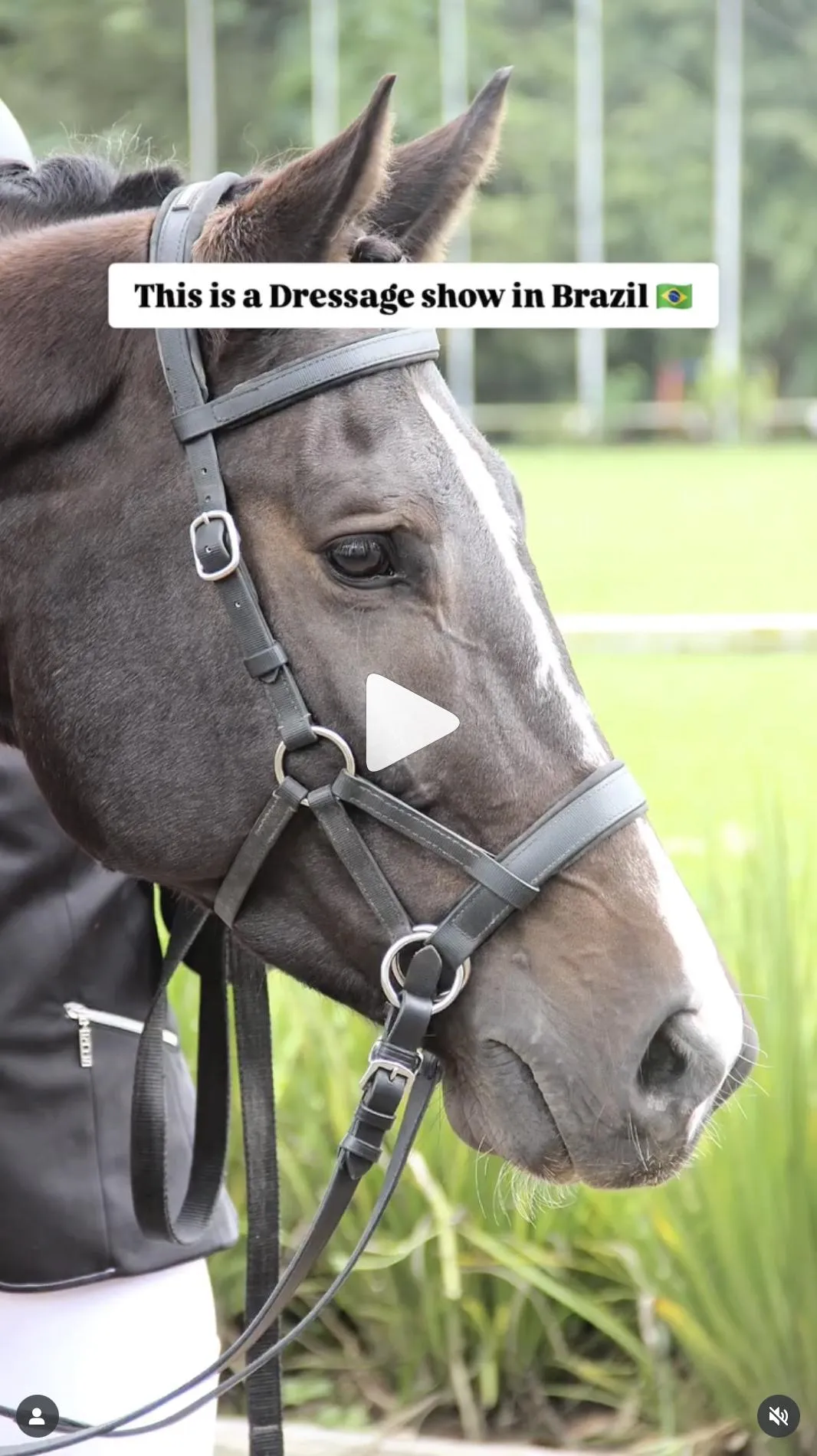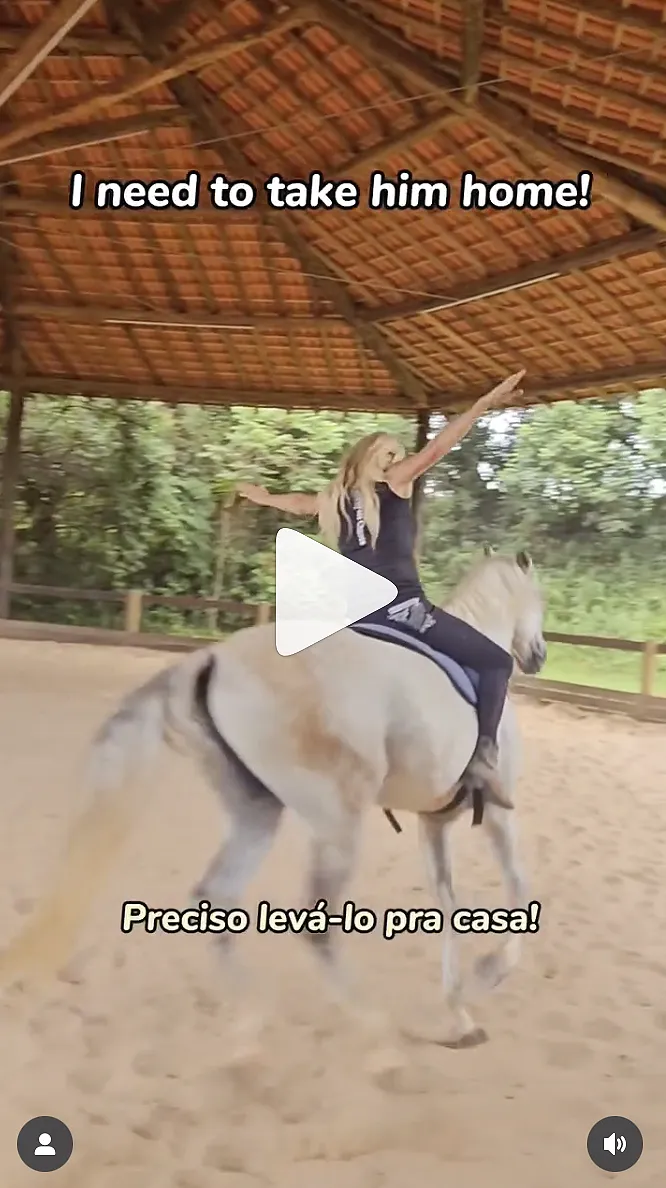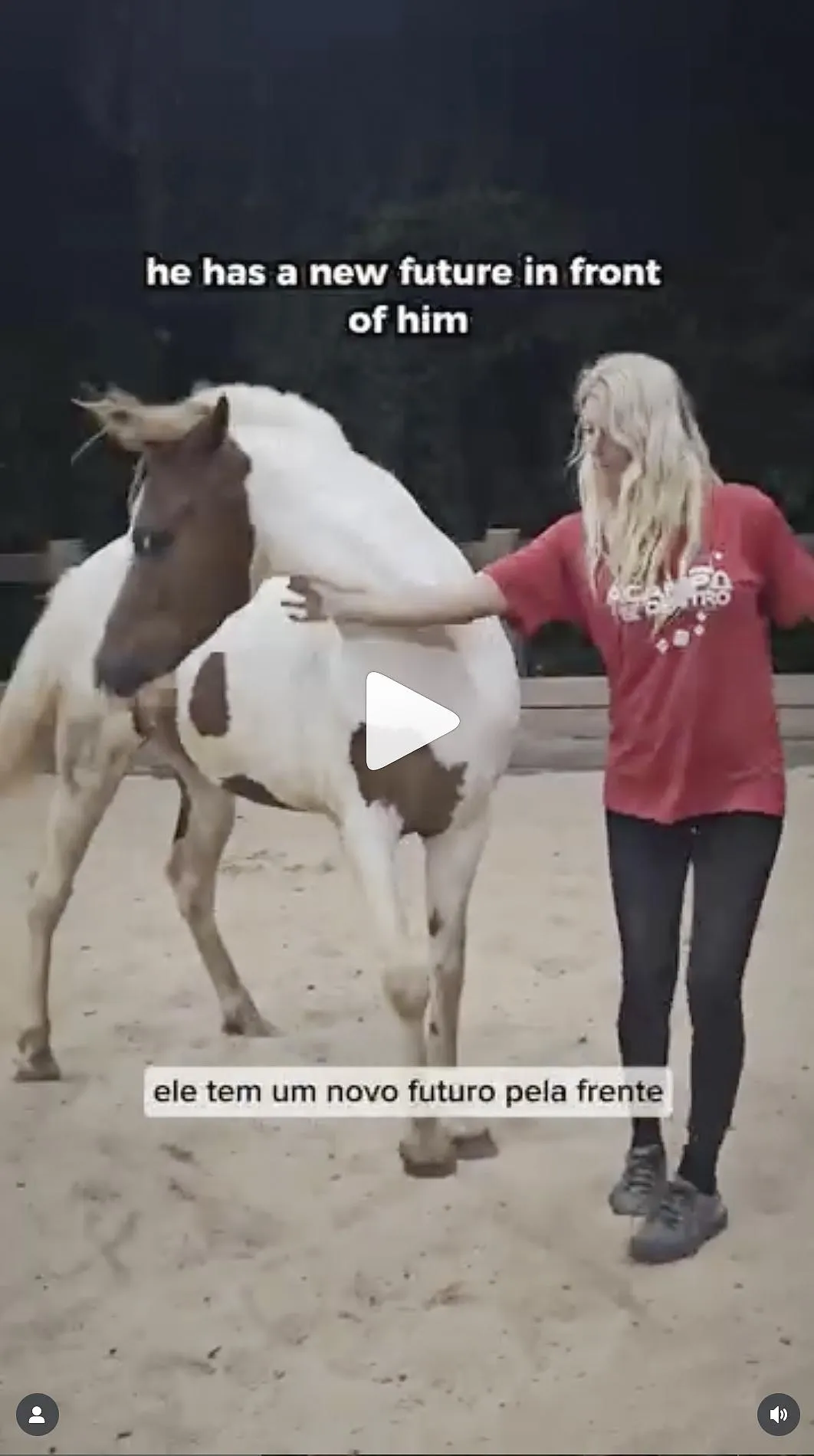NATURAL HORSEMANSHIP TRAINING
AND BITLESS RIDING
WHC Brazil
NATURAL HORSEMANSHIP TRAINING AND BITLESS RIDING
WHC Brazil
New Clinics & Camps Brazil
January and February 2026
In Brazil, one of many horses that stole my heart was the extraordinary stallion Xamã, whom I met at our special clinic:
'A Week of Welfare for Sport Horses' in São Paulo in 2024
I will always love Brazil! Every time I come here, I’m met with such warmth — so many wonderful people and incredible horses.
Like owner Isabel in this video with her magnificent 21-year-old Lusitano stallion, Xamã.
He is truly exceptional — watch him in the video on the left as he learns to sit down and lay down - and I think you might fall in love too.
In January and February 2026 we’ll be back with new clinics and youth camps — this time in several different locations across Brazil, offering a variety of programs.
You can find the full schedule for both clinics and camps further down on this page — and I invite you to join us for some unforgettable days together.
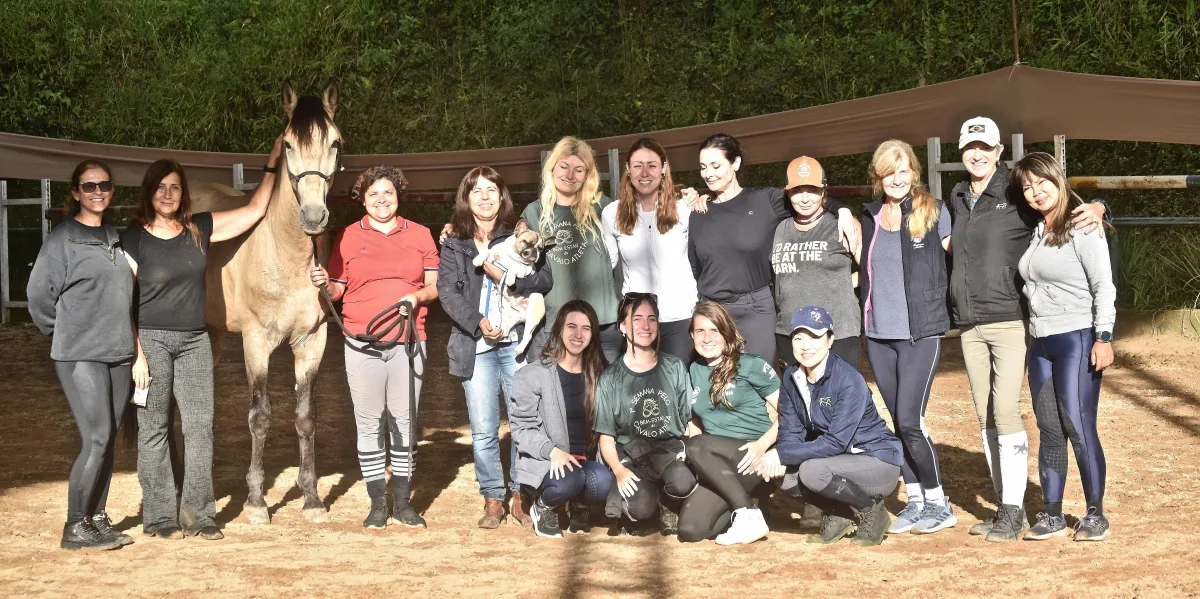
I will always love Brazil! Every time I come here, I’m met with such warmth — so many wonderful people and incredible horses.
Like owner Isabel in this video with her magnificent 21-year-old Lusitano stallion, Xamã.
He is truly exceptional — watch him in the video on the left as he learns to sit down and lay down - and I think you might fall in love too.
In January and February 2026 we’ll be back with new clinics and youth camps — this time in several different locations across Brazil, offering a variety of programs.
You can find the full schedule for both clinics and camps further down on this page — and I invite you to join us for some unforgettable days together.

I first came to Brazil in 2023 after connecting with a university in São Paulo discussing the harmful effects of the bit and sharing my experiences with bitless riding. Through this collaboration, I met passionate horse people across the country — and together, we brought Brazil its very first Bitless Clinic.
This clinic was a great experience. Over several days, riders and horses explored a gentler, more responsive way of working together — from riding in bitless bridles and cordeos to completely free communication. The atmosphere was electric: curiosity, breakthroughs, and a shared vision for horses in Brazil.
Today, our work in Brazil has grown into a wide range of activities — from clinics and training courses to children’s riding camps — all with one goal: to improve the overall well-being of horses.
Brazil is home to many passionate horse people and extraordinary equestrian facilities. However, in many places, horses have little or no access to turnout and spend all day confined in stalls — a lifestyle that is not compatible with their well-being or a natural horse life.
I know that every horse owner in Brazil wants the very best for their animals; it’s simply an area that hasn’t received much focus historically. That’s why we dedicate significant effort to raising awareness and promoting changes that give horses more freedom, movement, and a better quality of life. That’s why we are putting it front and center in everything we do here.
I still enjoy the very sweet welcoming drawing at my first Brazil Clinic, where I met Marina Estrella the first time. Marina is now my partner in Brazil and representing WHC in Brazil through out the year - much more about Marina below...
I first came to Brazil in 2023 after connecting with a university in São Paulo discussing the harmful effects of the bit and sharing my experiences with bitless riding. Through this collaboration, I met passionate horse people across the country — and together, we brought Brazil its very first Bitless Clinic.
This clinic was a great experience. Over several days, riders and horses explored a gentler, more responsive way of working together — from riding in bitless bridles and cordeos to completely free communication. The atmosphere was electric: curiosity, breakthroughs, and a shared vision of a kinder future for horses in Brazil.
Today, our work in Brazil has grown into a wide range of activities — from clinics and training courses to children’s riding camps — all with one goal: to improve the overall well-being of horses.
Brazil is home to many passionate horse people and extraordinary equestrian facilities. However, in many places, horses have little or no access to turnout and spend all day confined in stalls — a lifestyle that is far from compatible with their well-being or a natural horse lift.
I know that every horse owner in Brazil wants the. very best for their animals; it’s simply an area that hasn’t received much focus historically. That’s why we dedicate significant effort to raising awareness and promoting changes that give horses more freedom, movement, and a better quality of life.
That’s why we are putting it front and center in everything we do here.
I still enjoy the very sweet welcoming drawing at my first Brazil Clinic, where I met Marina Estrella the first time. Marina is now my partner in Brazil and representing WHC in Brazil through out the year - much more about Marina below...
Marina Estrella
WHC Representative in Brazil
With her passion and dedication, Marina is the perfect ambassador for When Horses Choose in Brazil.
I have been working with Marina for three years now, and every day she is dedicated to improving horse welfare in Brazil, promoting bitless riding, and organizing clinics and camps across the country. This year, she even hosted Brazil’s very first all-bitless competition. She is doing an incredible job.
I meet with Marina several times a year – both when I travel to Brazil to teach clinics and camps, and when she comes to Denmark to help me run courses and children’s riding camps here.
IIt’s clear that Marina is a true WHC, as she also welcomes animals beyond horses into training — here she is working with a mule. The WHC method has proven to work well with other species as well.


Marina Estrella
WHC Representative in Brazil


I first met Marina Estrella when I arrived at the airport in São Paulo. She had been booked as my interpreter for the clinic I was giving in the area, and it was Marina who came to pick me up at the airport.
Within just a few days, it was clear that Marina and I were brought together by more than chance. What began as a simple interpreter’s role soon grew into a friendship and a partnership that felt as a natural next step for both of us.
Today, Marina is the heart and daily manager of WHC in Brazil throughout the year, while I travel there once or twice annually to teach clinics and camps.
And every summer, Marina comes to Denmark to join me at the children’s riding camps — making our collaboration a true exchange across continents.
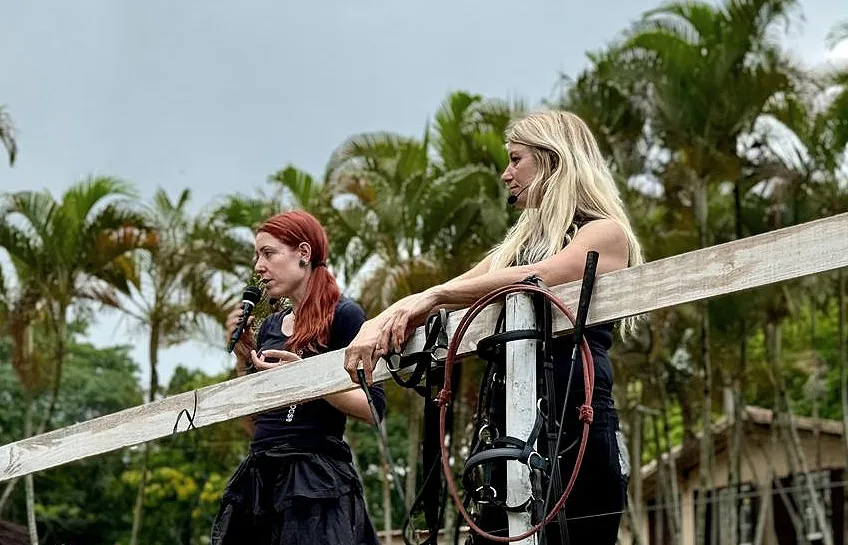
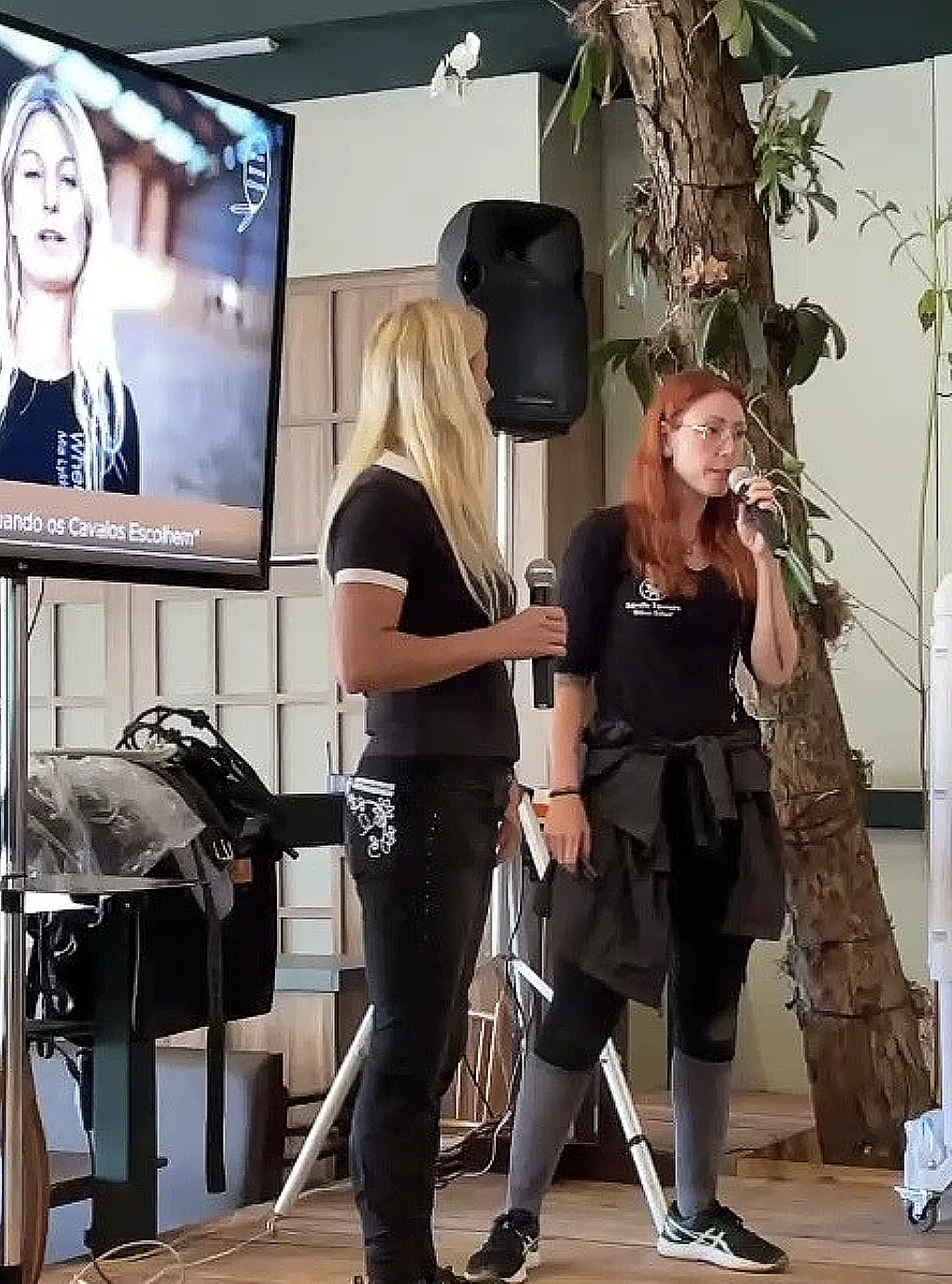
Just before we met, Marina had decided that she wanted to dedicate her life to working with horses — but she hadn’t quite figured out how. After interpreting at my clinic, she knew exactly how she wanted to work with them, and we agreed that Marina would take on the daily management of WHC Brazil.
She had heard me repeat again and again during the clinic how important turnout and herd life are for horses — or at the very least, having one companion to share a paddock with. This makes a huge difference not only for a horse’s mental well-being, but also for its physical health and overall soundness.
In the Brazilian hippicas (which often don’t even have paddocks at their facilities), it’s common practice for groomers to enter the stall every day to clean, feed, and even groom the horse. In many cases, it’s also the groomer who saddles the horse inside the stall, leads it to the arena for the rider, and later returns it to the stall after the ride.
It was very difficult for me to see so many horses standing in rows of stalls day after day, often with nothing more than — if they were lucky — the chance to stick their heads out of the stall door. Marina and I also held an internal course for many of the groomers there, focusing on the importance of turnout time.
It was such an important topic that I was also allowed to give a talk for both horse owners and the owners of the hippicas. I found it extraordinary that the hippica owners allowed me to do this, because after all, it is their business at stake — and many of them simply don’t have more land to dedicate to turnout.
But I believe the message still resonated with many horse owners and hippica owners in Brazil. I think everyone realized that this is an issue we must find better solutions for — together. I think everybody instantly knew that it was not possible to ignore these facts and that now was the time to bring focus to this matter.
Marina understood this and immediately took action. Even before I left Brazil the first time, she had moved her own horses to facilities with proper pastures and turned them out — together — in a big field for the very first time. See the video and feel the freedom for yourself.
It’s clear that Marina is a true WHC, as she also welcomes animals beyond horses into training — here she is working with a mule. The WHC method has proven to work well with other species as well.
With her passion and dedication, Marina is the perfect ambassador for When Horses Choose in Brazil.
I have been working with Marina for three years now, and every day she is dedicated to improving horse welfare in Brazil, promoting bitless riding, and organizing clinics and camps across the country. This year, she even hosted Brazil’s very first all-bitless competition. She is doing an incredible job.
I meet with Marina several times a year – both when I travel to Brazil to teach clinics and camps, and when she comes to Denmark to help me run courses and children’s riding camps here.
I first met Marina Estrella when I arrived at the airport in São Paulo. She had been booked as my interpreter for the clinic I was giving in the area, and it was Marina who came to pick me up at the airport.
Within just a few days, it was clear that Marina and I were brought together by more than chance. What began as a simple interpreter’s role soon grew into a friendship and a partnership that felt as a natural next step for both of us.
Today, Marina is the heart and daily manager of WHC in Brazil throughout the year, while I travel there once or twice annually to teach clinics and camps.
And every summer, Marina comes to Denmark to join me at the children’s riding camps — making our collaboration a true exchange across continents.


Just before we met, Marina had decided that she wanted to dedicate her life to working with horses — but she hadn’t quite figured out how. After interpreting at my clinic, she knew exactly how she wanted to work with them, and we agreed that Marina would take on the daily management of WHC Brazil.
She had heard me repeat again and again during the clinic how important turnout and herd life are for horses — or at the very least, having one companion to share a paddock with. This makes a huge difference not only for a horse’s mental well-being, but also for its physical health and overall soundness.
In the Brazilian hippicas (which often don’t even have paddocks at their facilities), it’s common practice for groomers to enter the stall every day to clean, feed, and even groom the horse. In many cases, it’s also the groomer who saddles the horse inside the stall, leads it to the arena for the rider, and later returns it to the stall after the ride.
It was very difficult for me to see so many horses standing in rows of stalls day after day, often with nothing more than — if they were lucky — the chance to stick their heads out of the stall door. Marina and I also held an internal course for many of the groomers there, focusing on the importance of turnout time.
It was such an important topic that I was also allowed to give a talk for both horse owners and the owners of the hippicas. I found it extraordinary that the hippica owners allowed me to do this, because after all, it is their business at stake — and many of them simply don’t have more land to dedicate to turnout.
But I believe the message still resonated with many horse owners and hippica owners in Brazil. I think everyone realized that this is an issue we must find better solutions for — together. I think everybody instantly knew that it was not possible to ignore these facts and that now was the time to bring focus to this matter.
Marina understood this and immediately took action. Even before I left Brazil the first time, she had moved her own horses to facilities with proper pastures and turned them out — together — in a big field for the very first time. See the video and feel the freedom for yourself.
New Clinics in Brazil January
and February 2026
In January 2026 I will once again travel to Brazil,
and WHC will be hosting four clinics and again our special event with other trainers and vets: 'A week of Welfare for sport horses'.
10-11 January
Clinic in Bahia
January 17–18
Clinic in Minas Gerais
January 30–February 1
Week for Welfare at Luck's
February 2
Clinic “Bitless for Professionals” at Luck's
February 7–8
Clinic “Bitless in Equine Therapy” at Luck's
(in collaboration with the National Equine Therapy Association)
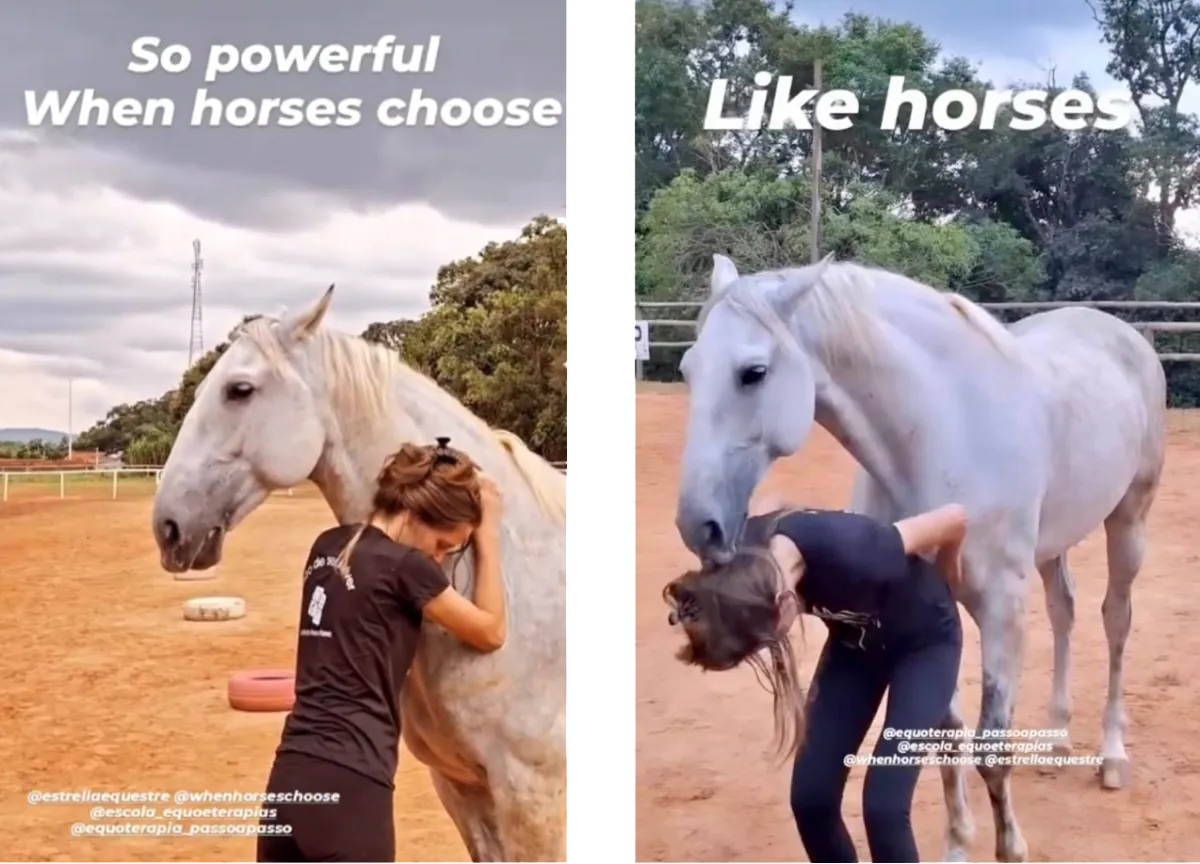
This year’s program includes a clinic with a strong focus on equine welfare, featuring guest trainers and veterinarians from Brazil – ensuring exciting and diverse perspectives.
We are also offering a Bitless for Professionals clinic, and one dedicated to Bitless in Equine Therapy. These will be days full of inspiration, exchange of knowledge, and a shared passion for working with horses.
In a full week we had plenty of time to work with many disciplines - also working with balance training. The Passo a Passo riding therapy centre in Sao Paolo is a great course location. It is place I will come back to again and again in the future. A favorite place of mine. See the video of the clinic balance training above.
This is day 4 of our first clinic and our particpants are now fully comfortable riding their horses in only a cordeo. This is the first step and from here we can begin to work with dressage, jumping and other riding disciplines. I am looking forward to coming back again and working more with these horses, they were doing great!
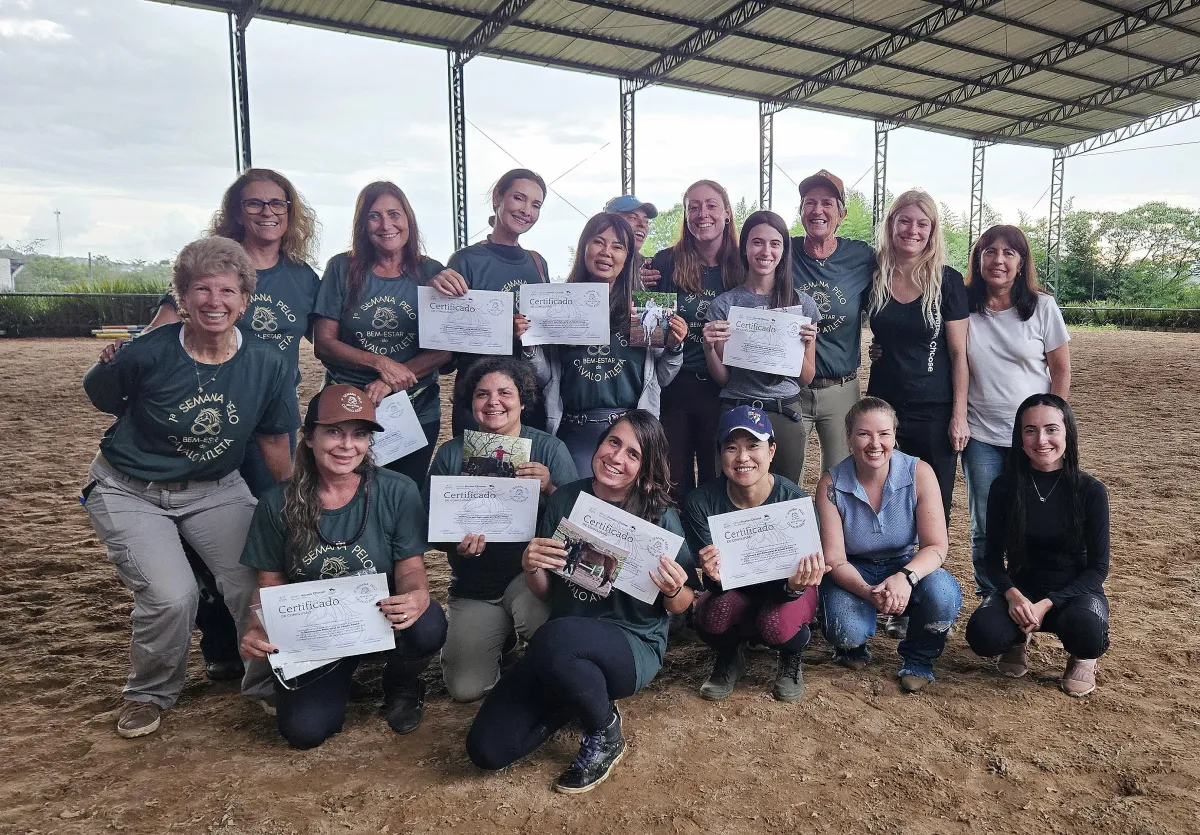
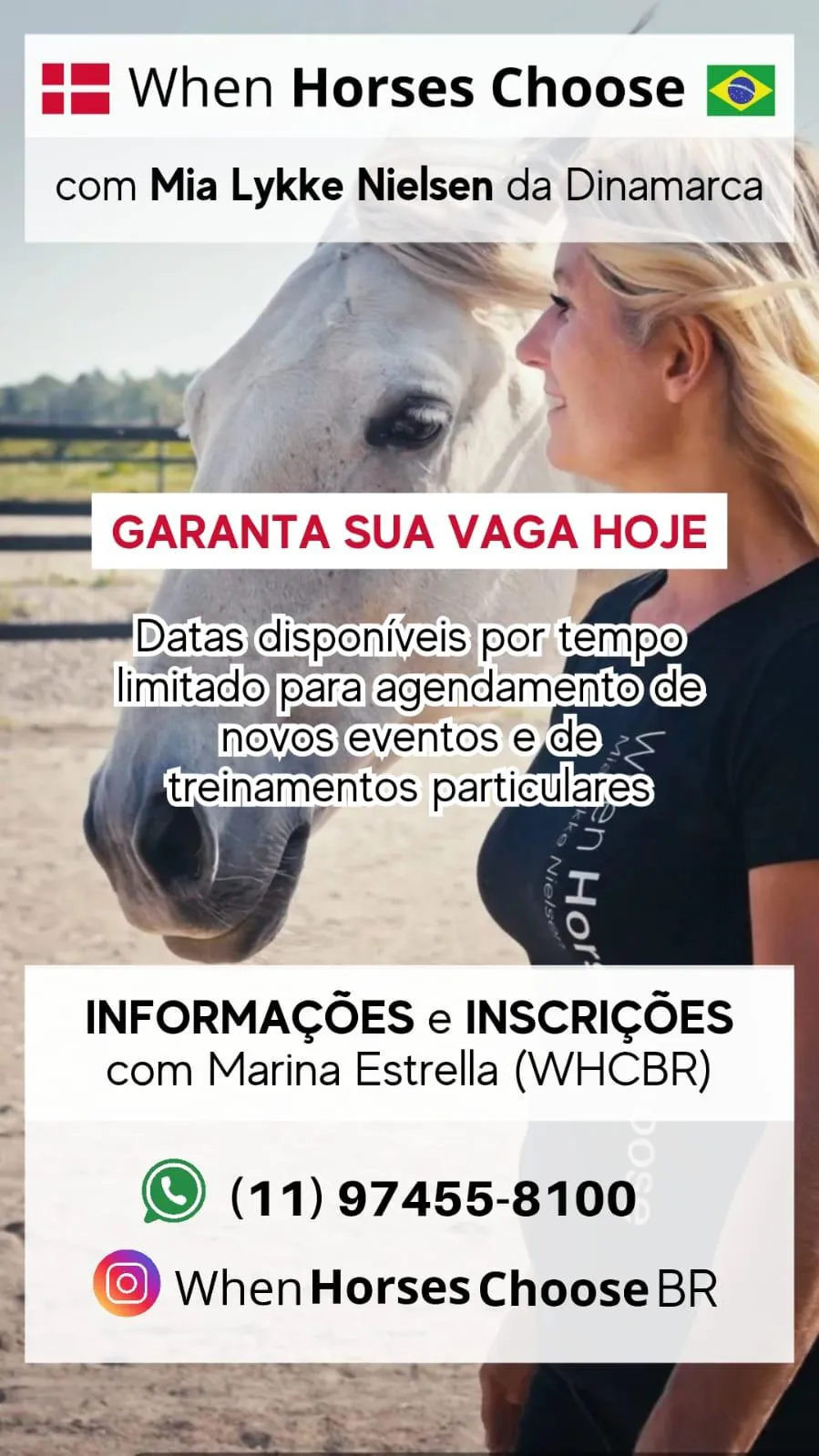
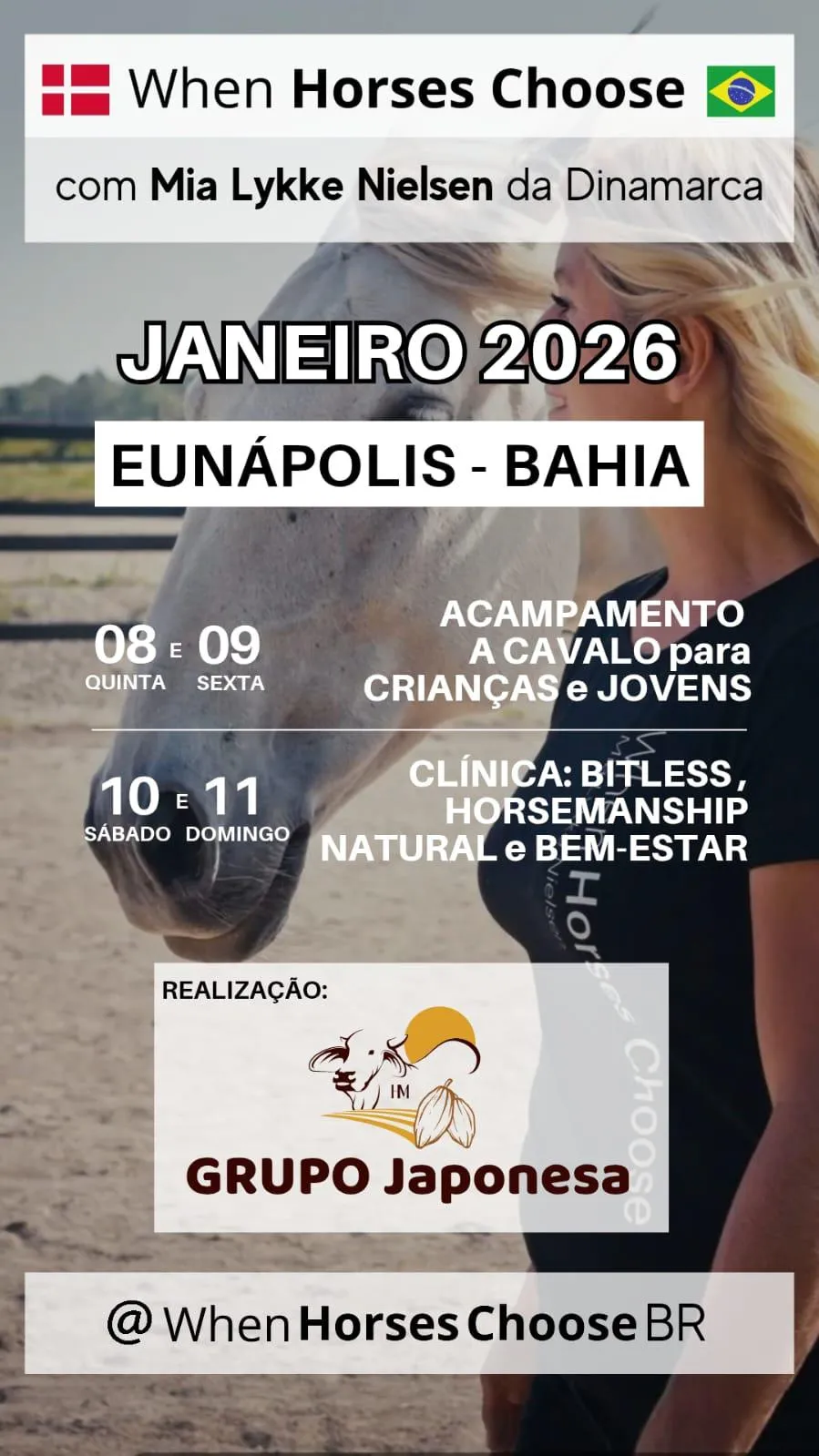
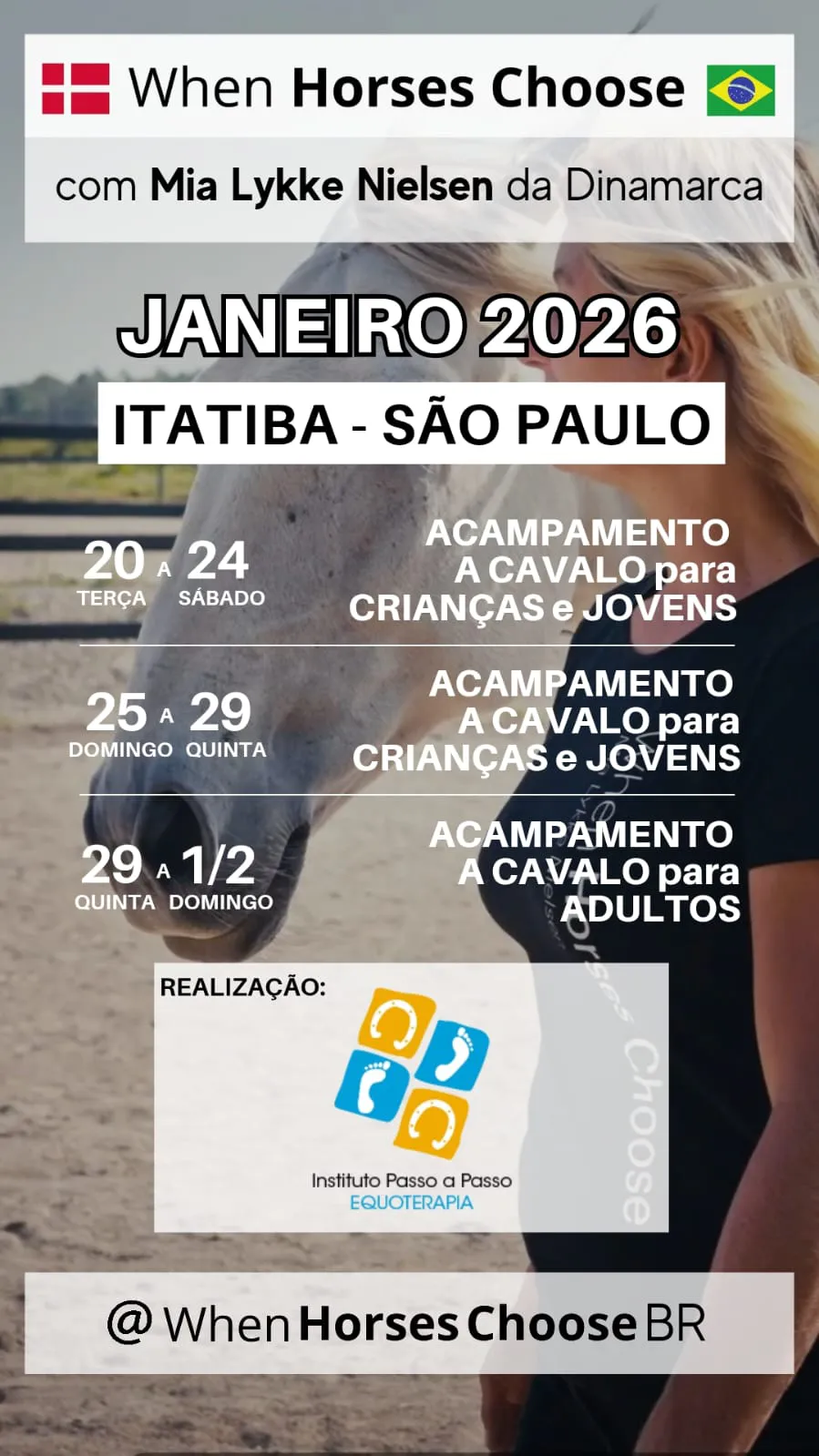
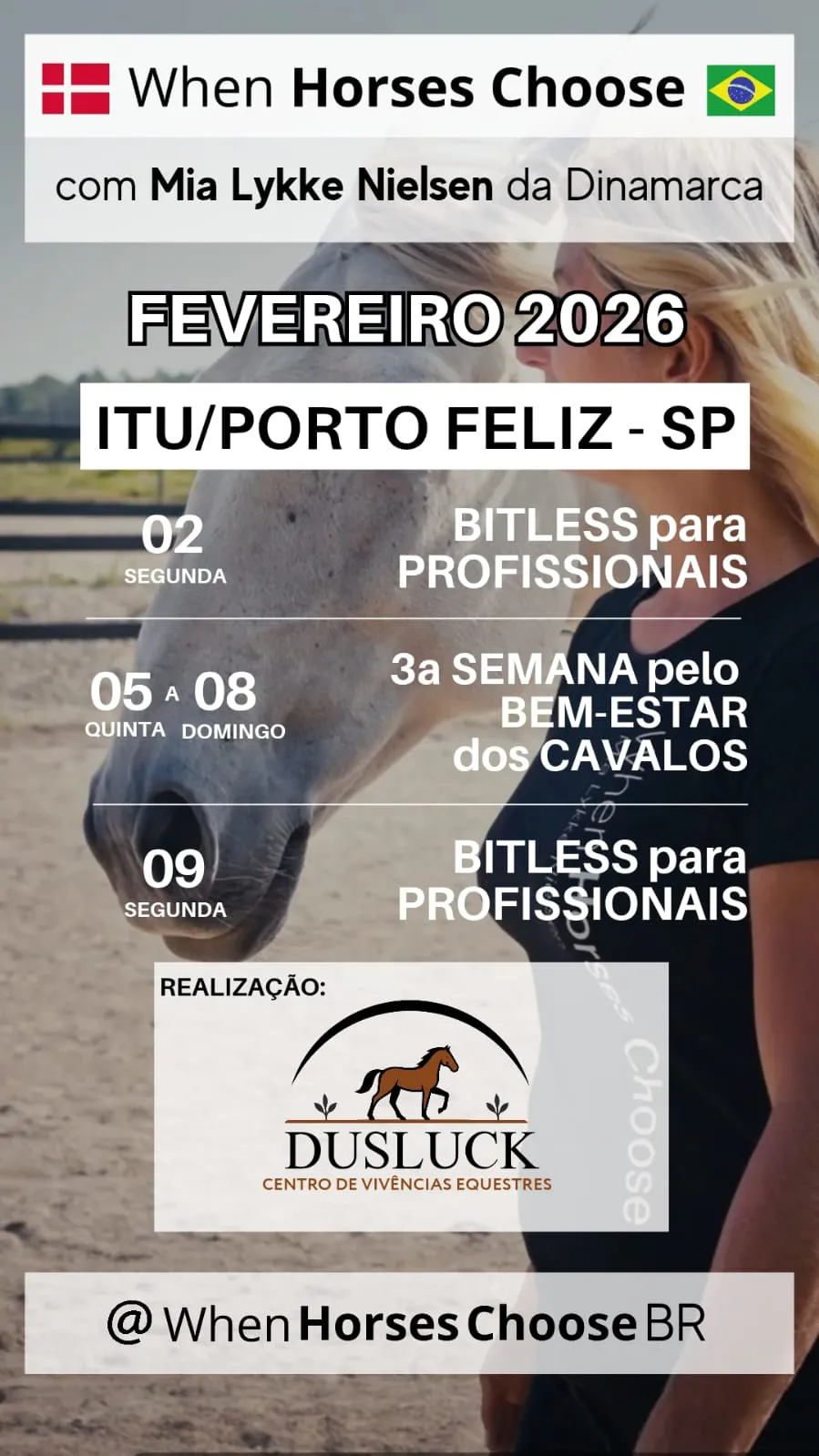
New Clinics in Brazil
January 2026
In January 2026 I will once again travel to Brazil, and WHC will be hosting four clinics:
January 17–18
Clinic in Minas Gerais
January 30–February 1
Week for Welfare at Luck's
February 2
Clinic “Bitless for Professionals” at Luck's
February 7–8
Clinic “Bitless in Equine Therapy”
at Luck's
(in collaboration with the National Equine
Therapy Association)
This year’s program includes a clinic with a strong focus on equine welfare, featuring guest trainers and veterinarians from Brazil – ensuring exciting and diverse perspectives.
We are also offering a Bitless for Professionals clinic, and one dedicated to Bitless in Equine Therapy. These will be days full of inspiration, exchange of knowledge, and a shared passion for working with horses.
In a full week we had plenty of time to work with many disciplines - also working with balance training. The Passo a Passo riding therapy centre in Sao Paolo is a great course location. It is place I will come back to again and again in the future. A favorite place of mine. See the video of the clinic balance training above.
This is day 4 of our first clinic and our particpants are now fully comfortable riding their horses in only a cordeo. This is the first step and from here we can begin to work with dressage, jumping and other riding disciplines. I am looking forward to coming back again and working more with these horses, they were doing great!
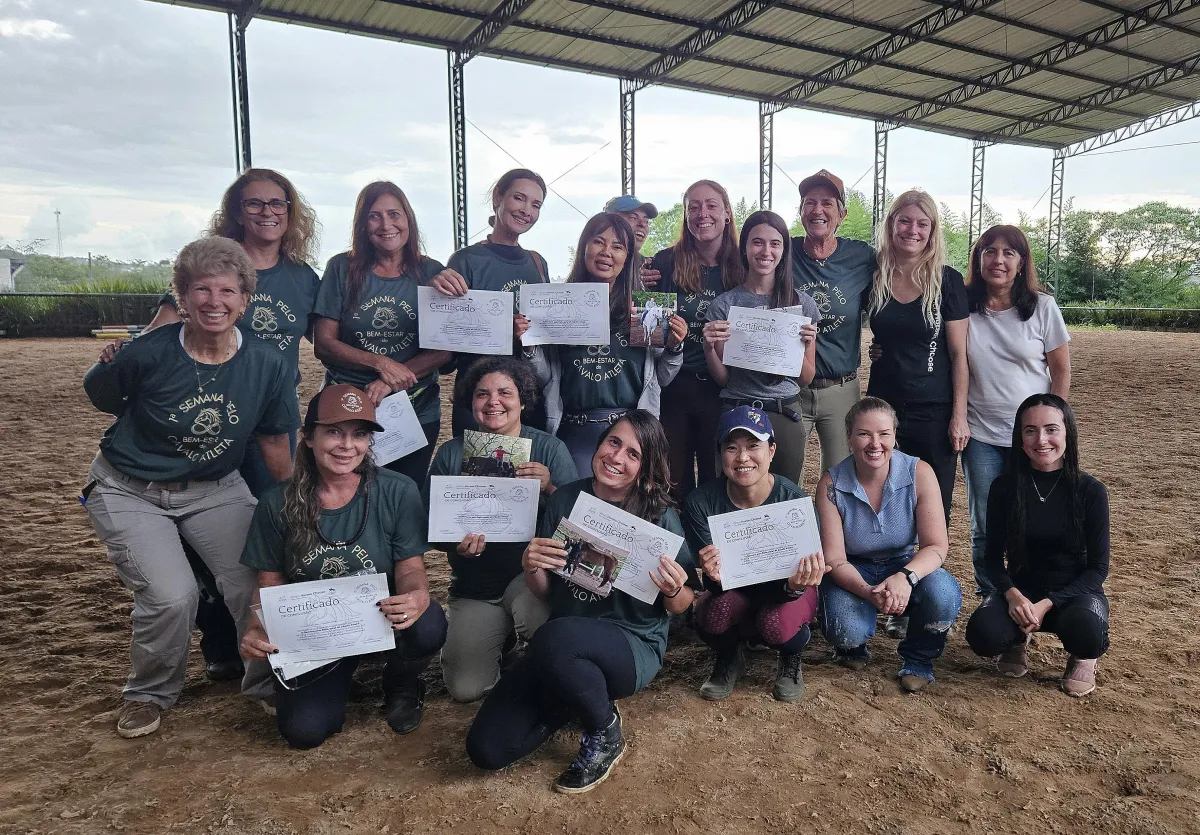




New Children and Youth Camps in Brazil, January 2026
Alongside the clinics, we will also be running four camps for children and young people of different ages. These camps are designed to be both fun and educational – combining horse welfare, training, and riding with creative activities.
A highlight, as always, will be the bitless treasure hunt ride that the kids love, making the camps a perfect mix of joy, learning, and adventure.
The energy and curiosity the children bring each year is truly inspiring, and we can’t wait to see them explore, grow, and have fun with us again. See video clips from Brazil camps below.
8-9 January
Mini-camp in Bahia
15-16 January
Miini-camp in Minas Gerais
20-24 January:
Passo a Passo Camp 1
25-29 January
Passo a Passo Camp 2
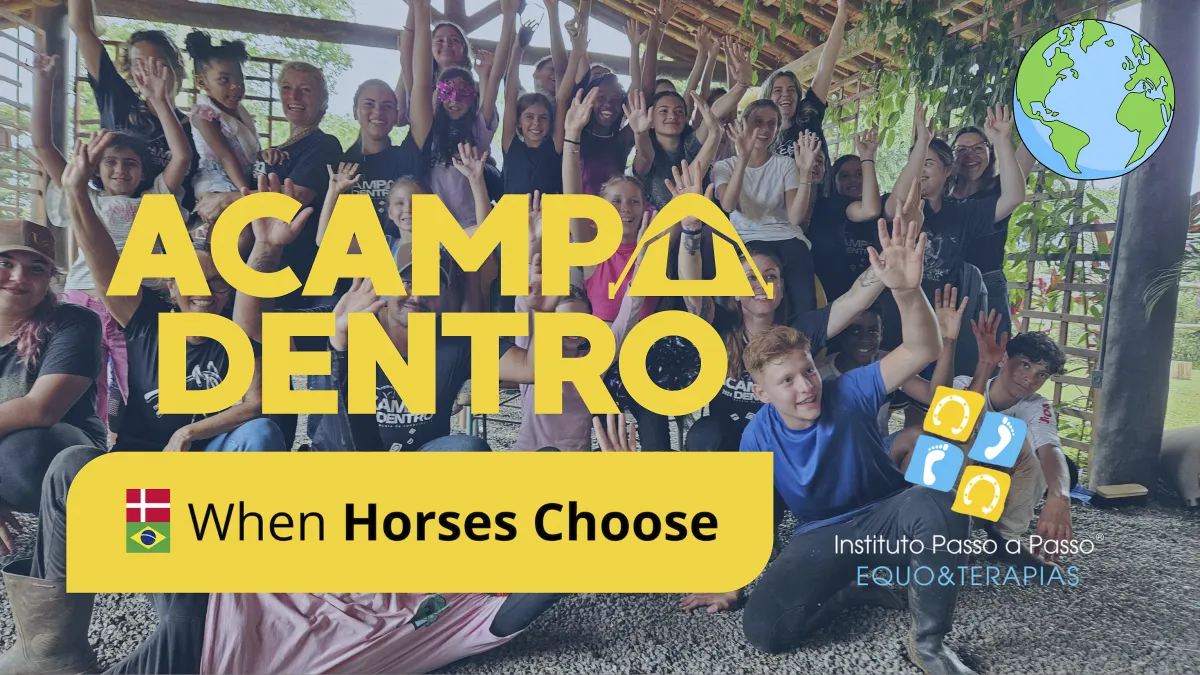
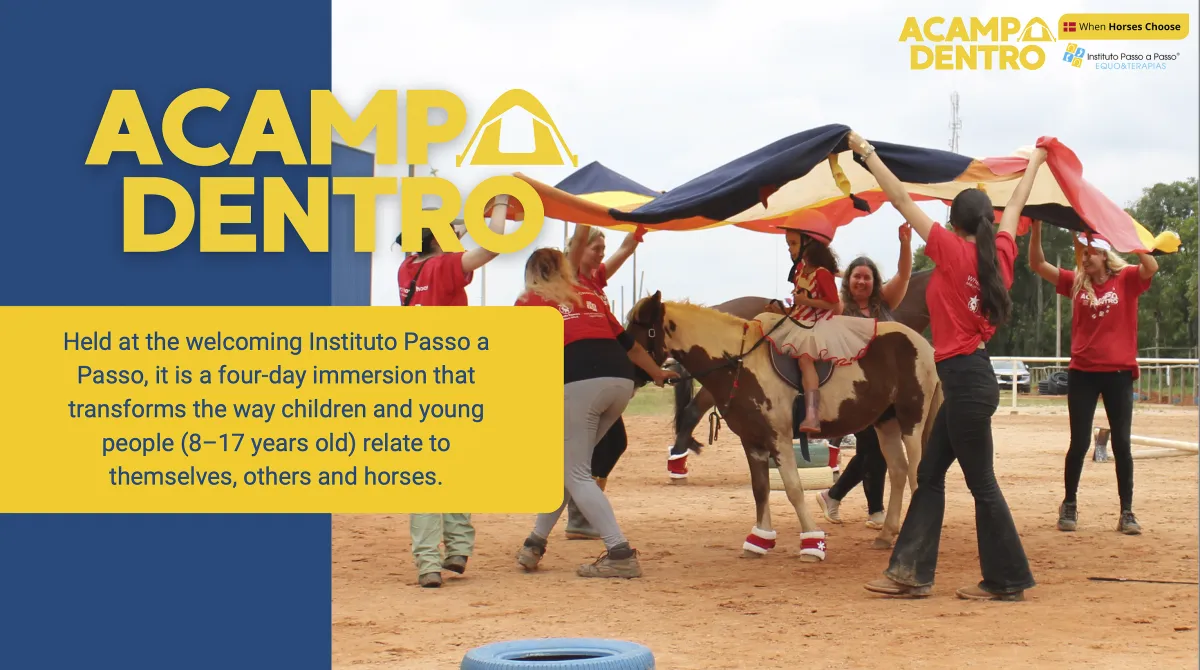
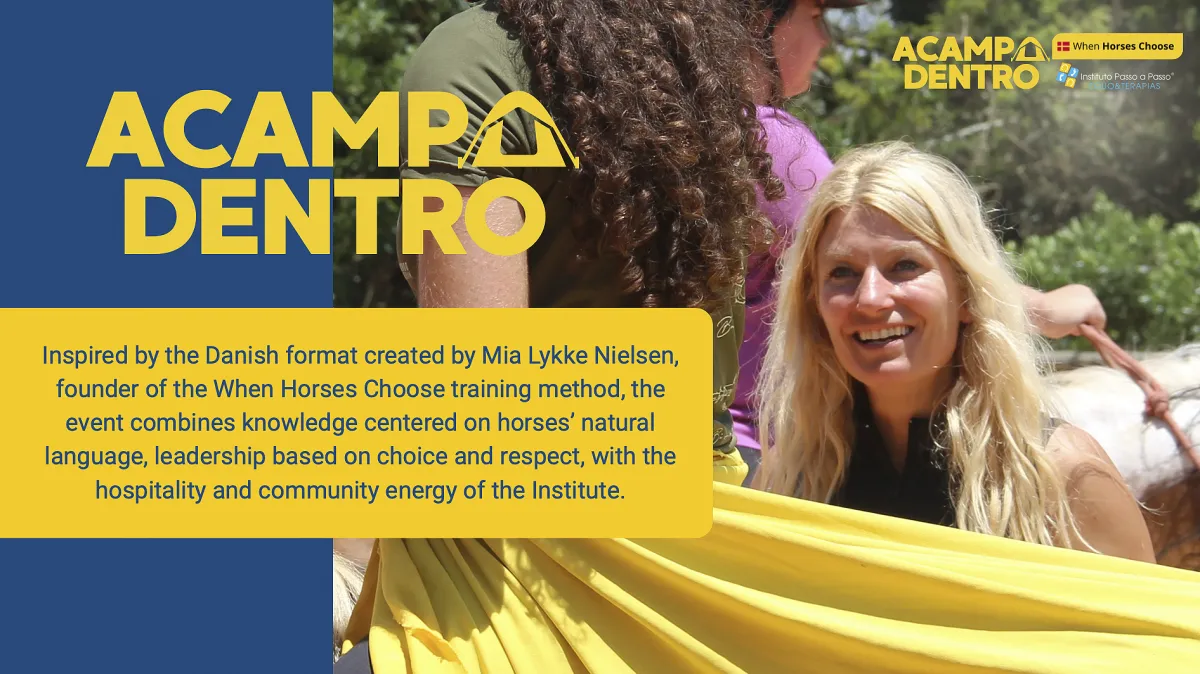
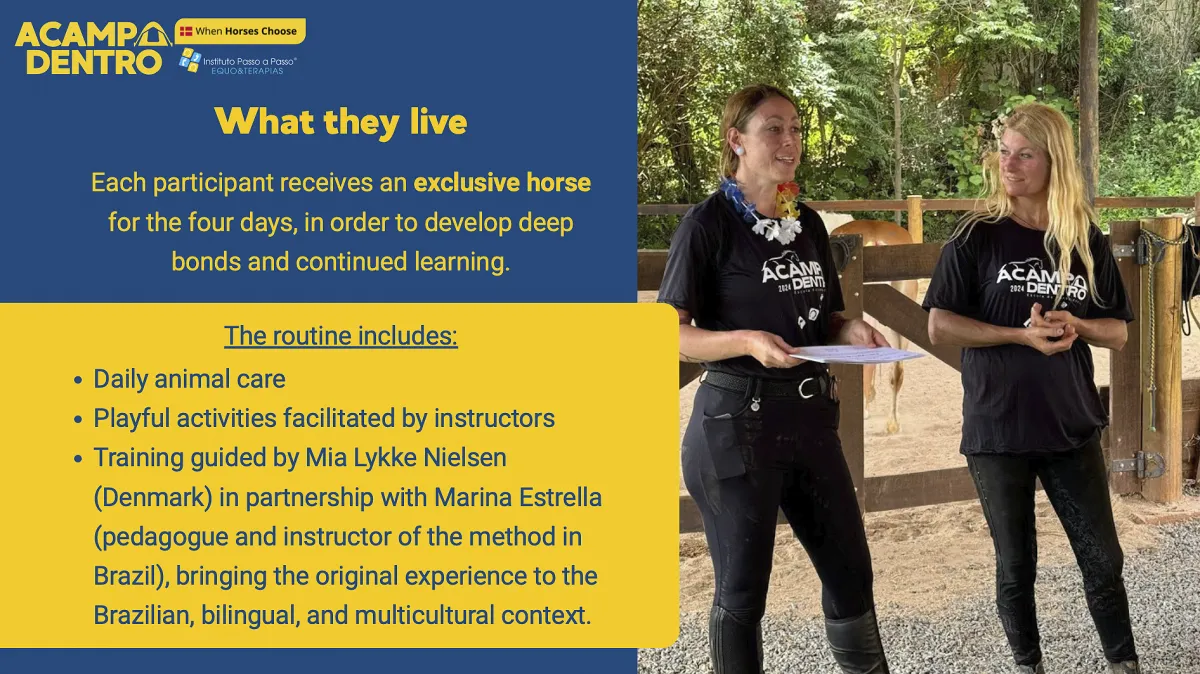
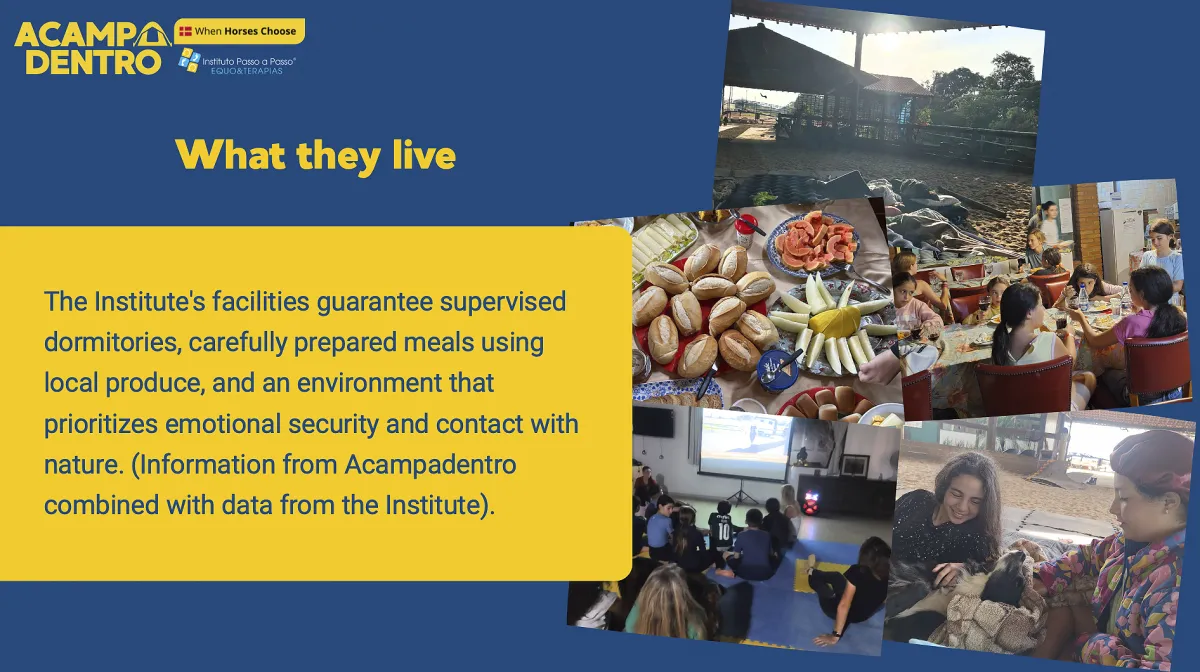
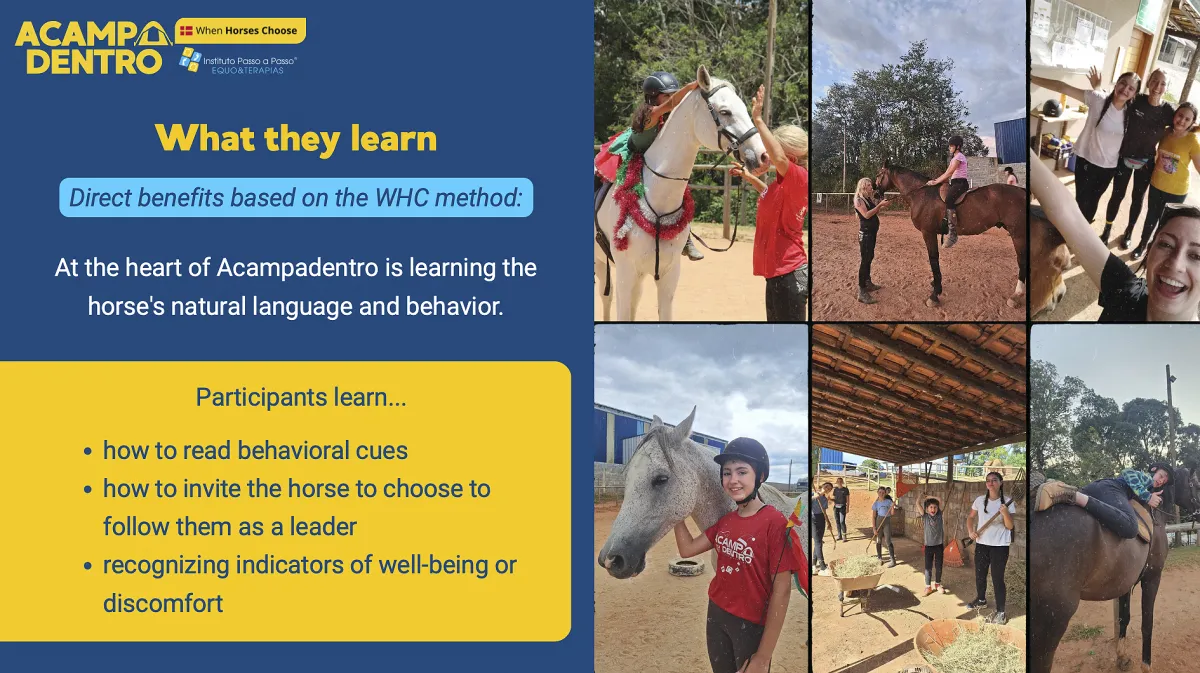
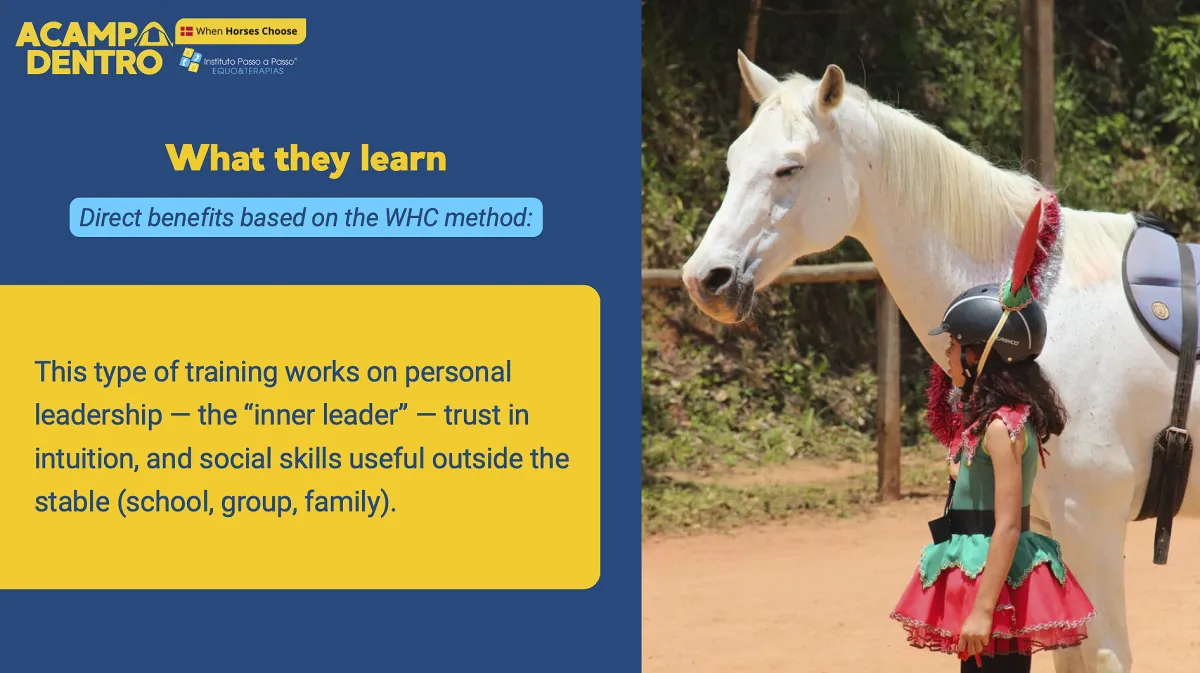
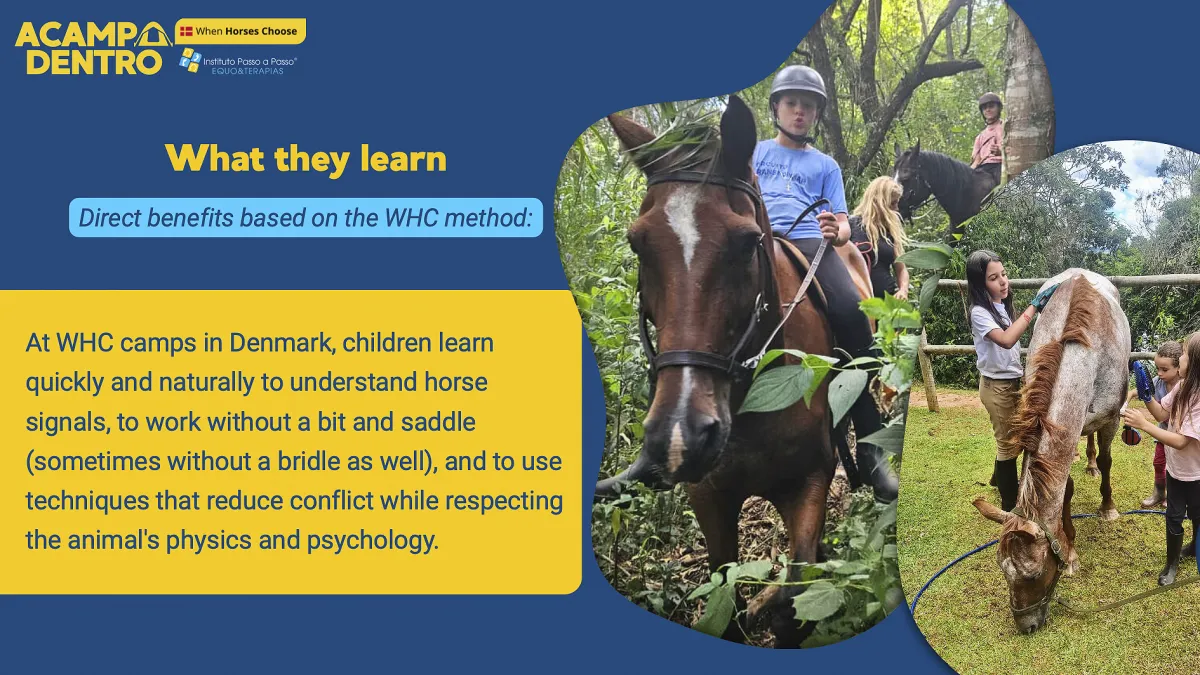
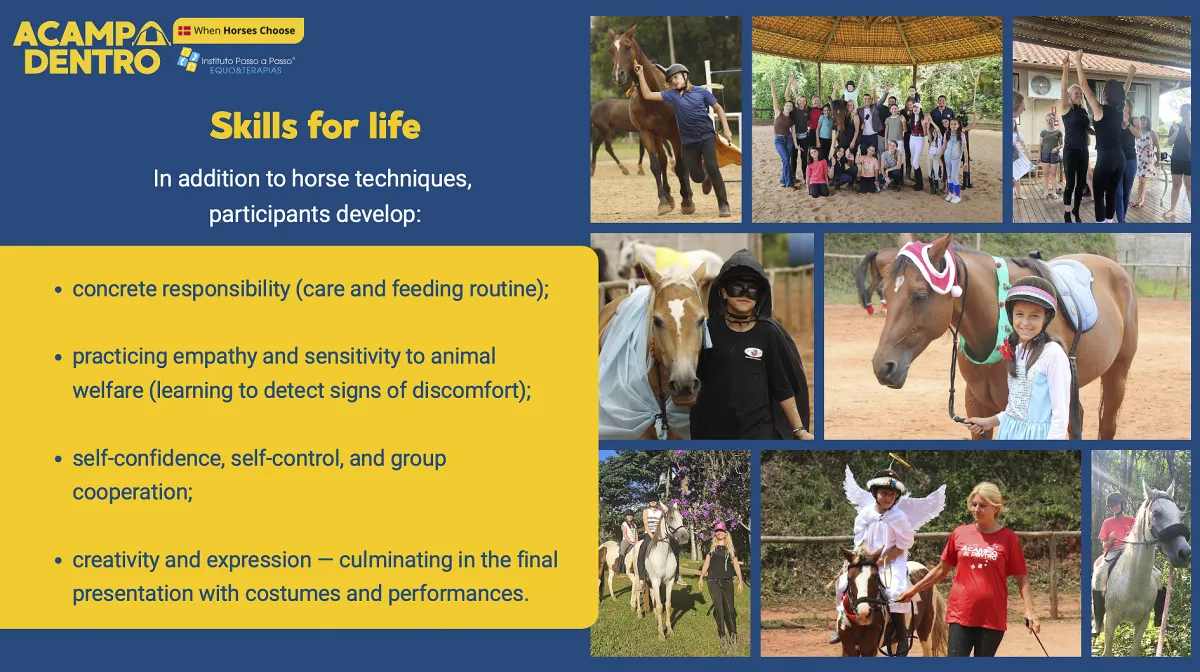
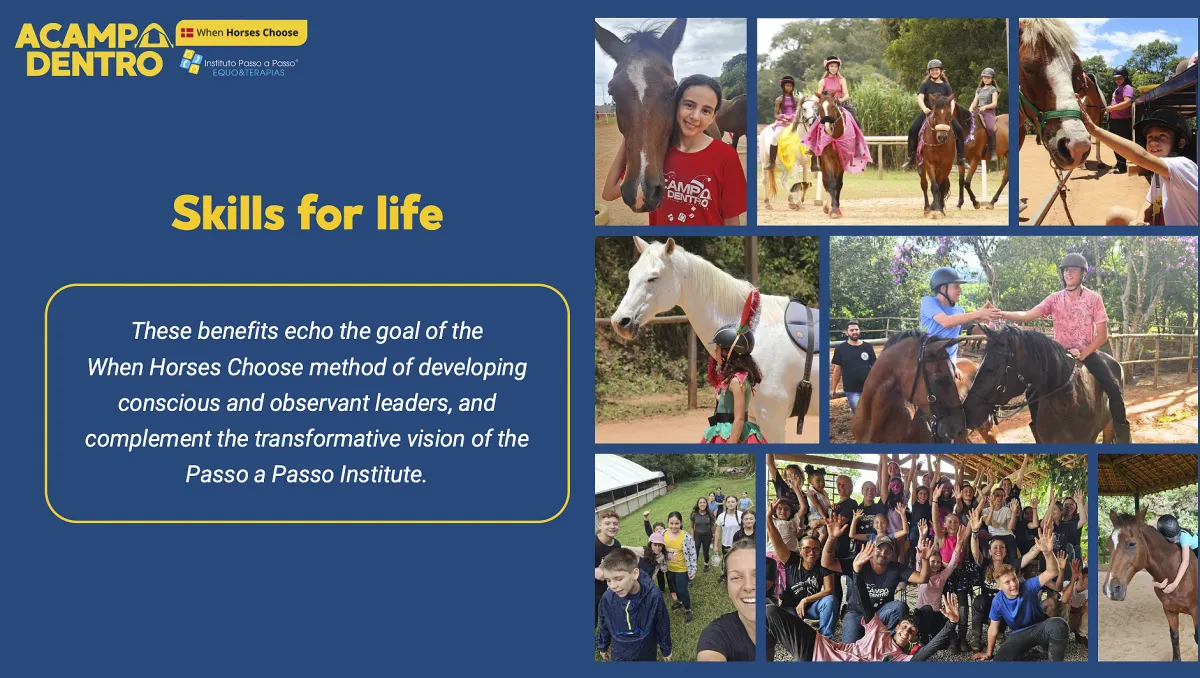
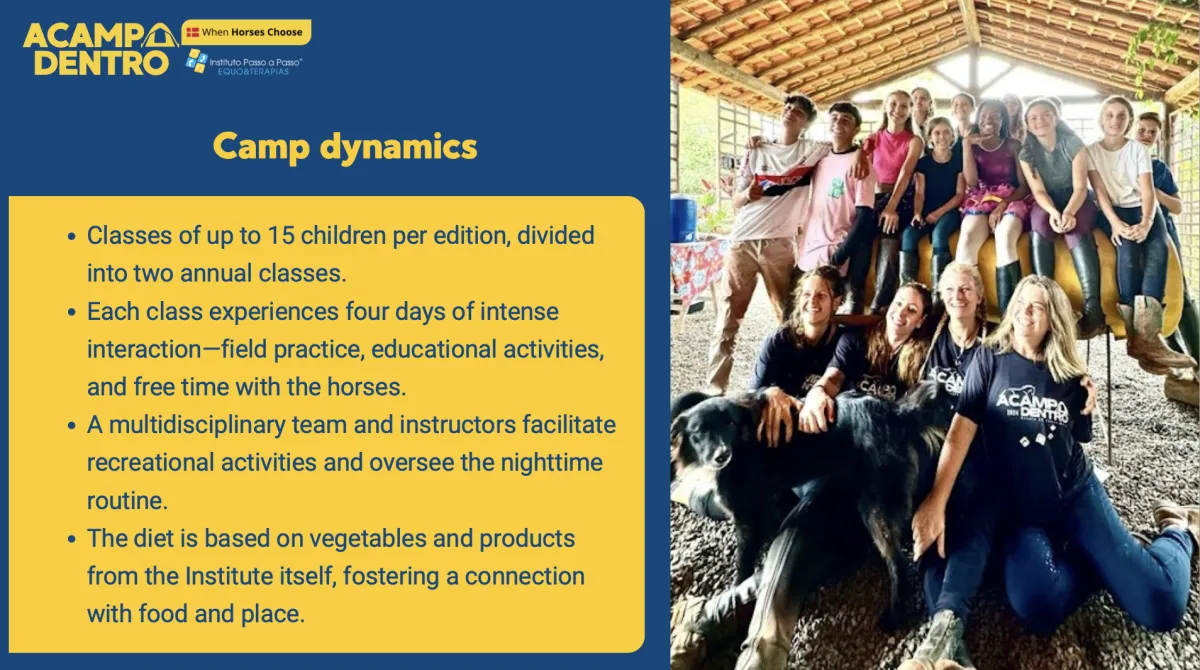
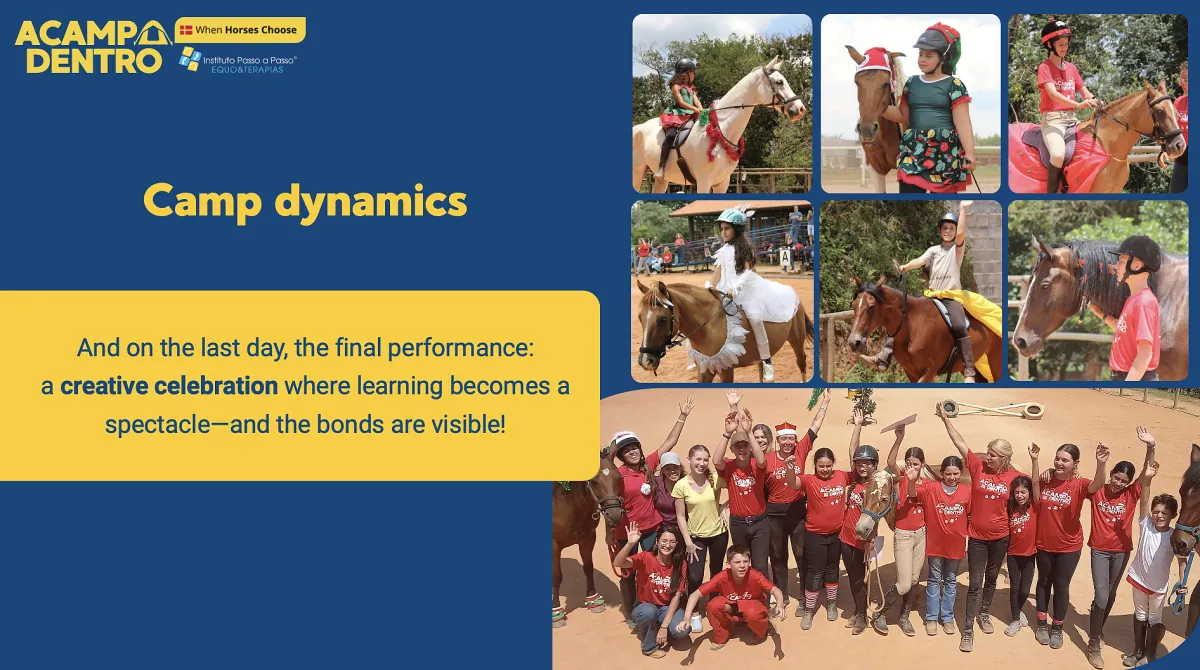
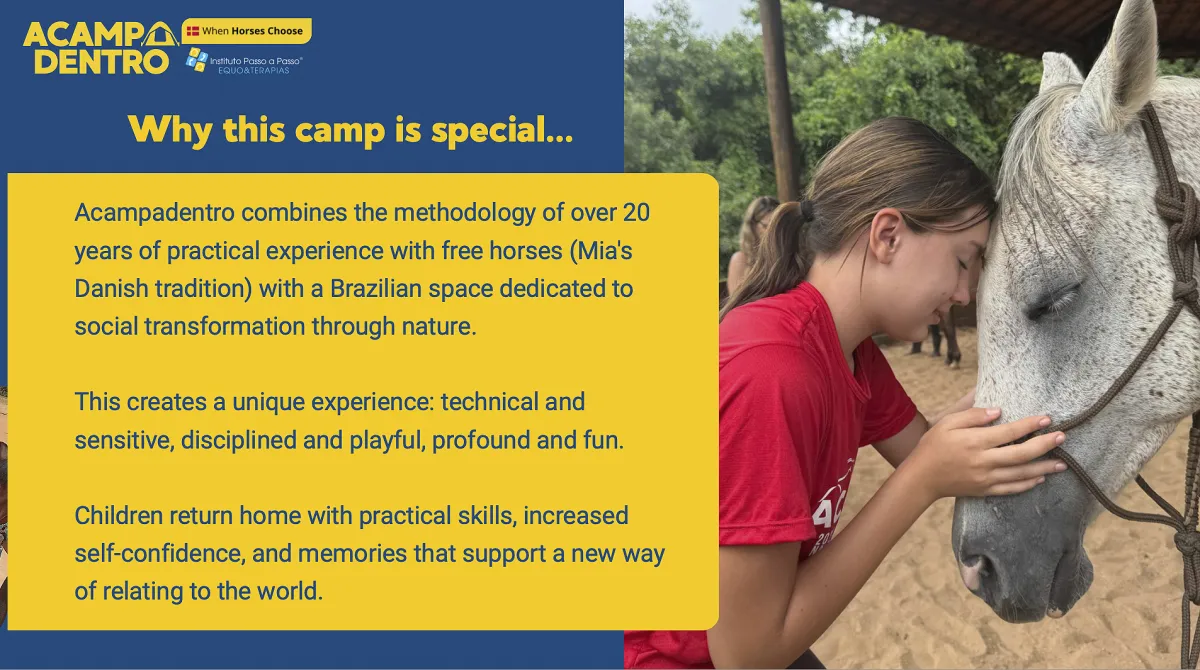
NEW: Adult Riding Camps in Brazil 2026
Due to growing public interest and requests, WHC will be offering Adult Riding Camps
in Brazil in January 2026
Many adults from around the world have asked us to create camps specifically for riders aged 18+. After finishing a course or a weekend clinic, the desire to continue learning and deepen the training is often very strong.
At Passo a Passo in Brazil, we now have the perfect location to launch this concept: six consecutive days of full accommodation, hands-on training, and complete immersion from morning to evening.
Clinics already provide valuable results, insights, and an understanding of the method. But a full week together allows participants to integrate these learnings even more, making the experience deeper and longer-lasting.
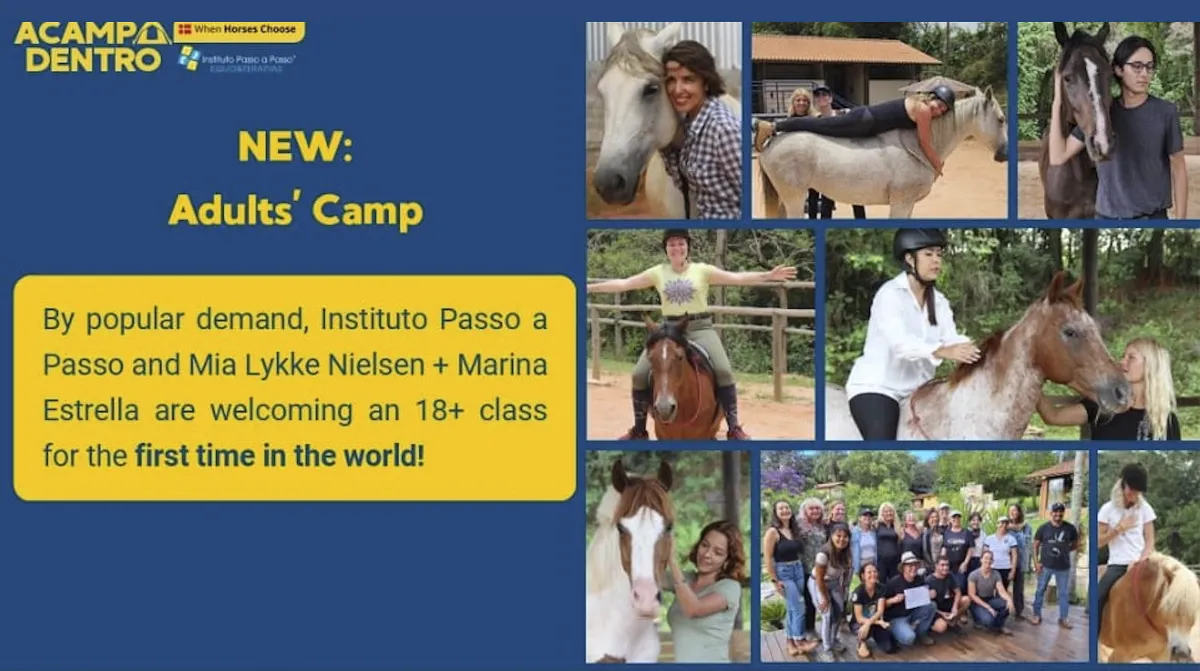
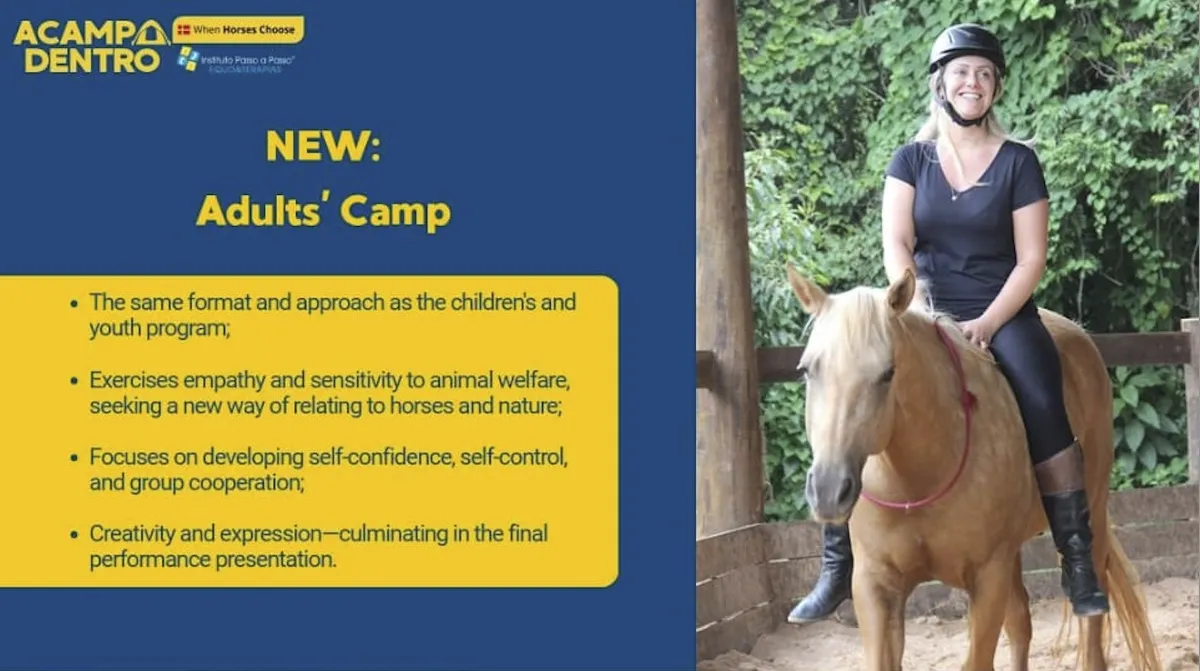
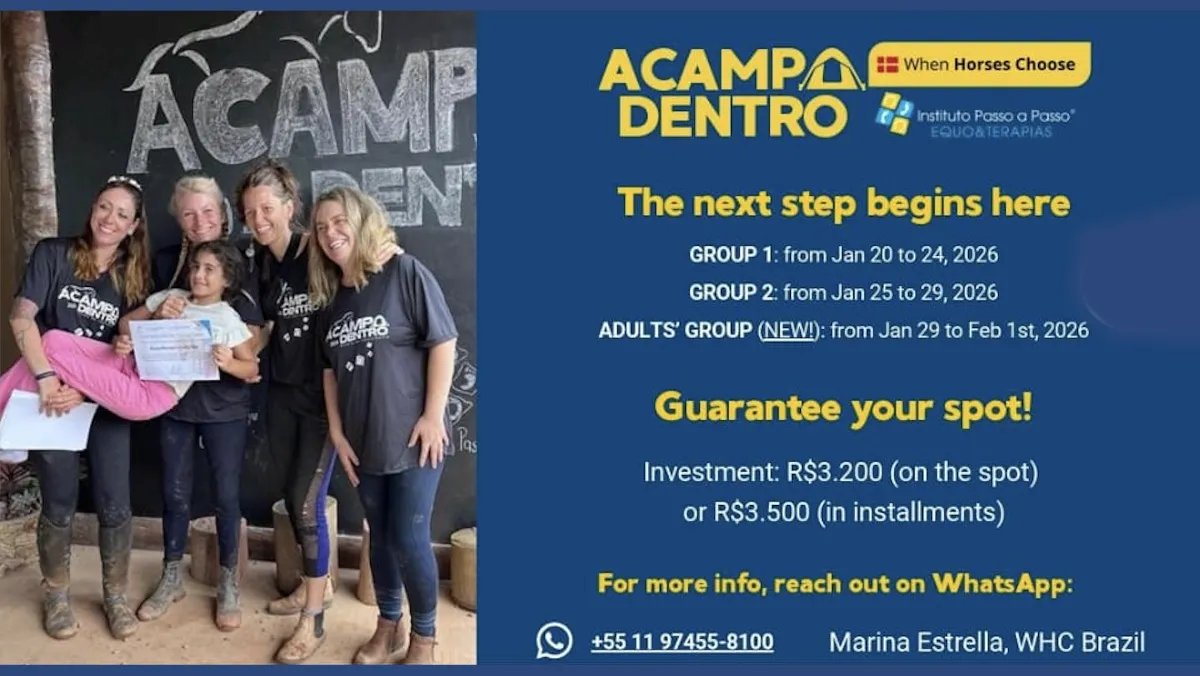
New Children and Youth Camps in Brazil, January 2026
Alongside the clinics, we will also be running four camps for children and young people of different ages. These camps are designed to be both fun and educational – combining horse welfare, training, and riding with creative activities.
A highlight, as always, will be the bitless treasure hunt ride that the kids love, making the camps a perfect mix of joy, learning, and adventure.
The energy and curiosity the children bring each year is truly inspiring, and we can’t wait to see them explore, grow, and have fun with us again. See video clips from Brazil camps below.
8-9 January
Mini-camp in Bahia
15-16 January
Miini-camp in Minas Gerais
20-24 January:
Passo a Passo Camp 1
25-29 January
Passo a Passo Camp 2












NEW: Adult Riding Camps
in Brazil 2026
Due to growing public interest and requests, WHC will be offering Adult Riding Camps in Brazil in January 2026
Many adults from around the world have asked us to create camps specifically for riders aged 18+. After finishing a course or a weekend clinic, the desire to continue learning and deepen the training is often very strong.
At Passo a Passo in Brazil, we now have the perfect location to launch this concept: six consecutive days of full accommodation, hands-on training, and complete immersion from morning to evening.
Clinics already provide valuable results, insights, and an understanding of the method. But a full week together allows participants to integrate these learnings even more, making the experience deeper and longer-lasting.



Horses need pastures and turn-out time daily
- and they need to be social with other horses!
Horses need pastures and turn-out time daily
- and they need to be social with other horses!
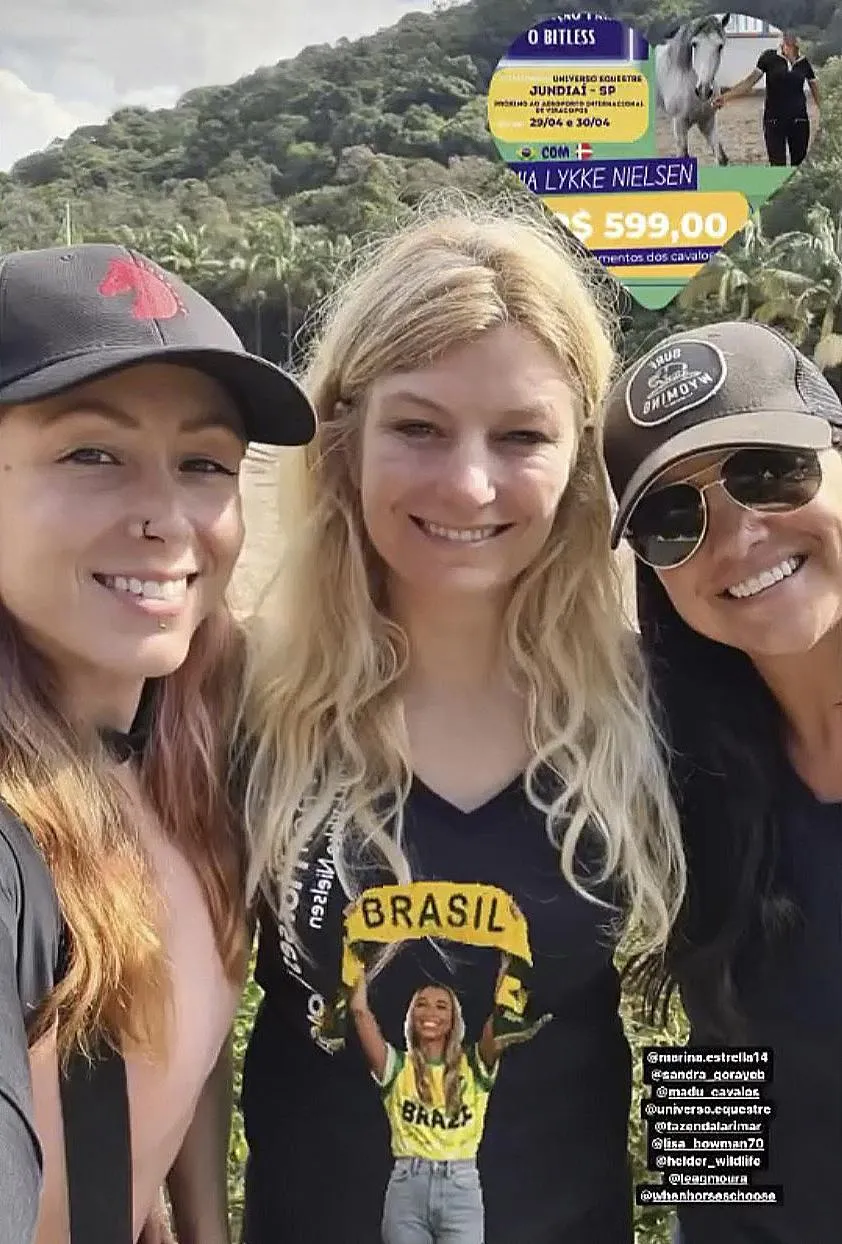
In spring 2023 WHC was visiting Brazil and doing clinics in the larger Sao Paolo area for the first time. Brazil is a very beautiful country and we got to meet so many nice people there - some will be friends for life!
Already in our first days in Sao Paolo we became aware that in Brazil many horses never have access to pastures. In most of the so-called 'hipicas' (large facilities with groomers for each horse and vets living on the places etc.) no pastures are available at all on the area.
The horses are confined in their stalls 24/7 and only gets out when the owner comes to ride the horse - maybe 2-3 hours per week. We hope that speaking up about it will somehow help make some changes in the future for horses I Brazil.
It was heart braking to see the horses standing alone in their stalls day in and day out - for years and years. Even though we were there to teach bitless training, this fact about Brazilian 'hipicas' is a much bigger problem than riding with a bit.
We chose to ask participants in clinics to stay longer on one clinic day and we talked about the importance pasture time. It was impossible to ignore the situation.
It is so common in Brazil to have horses in stalls all the time and also the owners of the 'hipicas' doesn't even have/own anymore free land to make pastures for the horses, even if they decided to. So not really very easy to change this situation for the horses, but things really must change, they must find other solutions.

In spring 2023 WHC was visiting Brazil and doing clinics in the larger Sao Paolo area for the first time. Brazil is a very beautiful country and we got to meet so many nice people there - some will be friends for life!
Already in our first days in Sao Paolo we became aware that in Brazil many horses never have access to pastures. In most of the so-called 'hipicas' (large facilities with groomers for each horse and vets living on the places etc.) no pastures are available at all on the area.
The horses are confined in their stalls 24/7 and only gets out when the owner comes to ride the horse - maybe 2-3 hours per week. We hope that speaking up about it will somehow help make some changes in the future for horses I Brazil.
It was heart braking to see the horses standing alone in their stalls day in and day out - for years and years. Even though we were there to teach bitless training, this fact about Brazilian 'hipicas' is a much bigger problem than riding with a bit.
We chose to ask participants in clinics to stay longer on one clinic day and we talked about the importance pasture time. It was impossible to ignore the situation.
It is so common in Brazil to have horses in stalls all the time and also the owners of the 'hipicas' doesn't even have/own anymore free land to make pastures for the horses, even if they decided to. So not really very easy to change this situation for the horses, but things really must change, they must find other solutions.
For countless reasons, it is absolutely essential that horses are given access to pasture. In their natural state, horses walk at least 25 kilometers every single day.
This constant movement stimulates their blood circulation, strengthens bones, muscles, tendons, and joints, and supports balance, flexibility, and healthy tissues.
Equally important, horses are herd animals — they need social interaction with other horses. This is not optional, but fundamental to their well-being.
On my next trip to Brazil magic happened again. A participant with two horse understood the importance of pasture time and social behavior and decided to move both her horses from living in confinement stalls to another facility with large pastures - these horses will be much happier and healthier horses.


We were happy to see posts on our social media from the Brazilian vets - they were already engaged!
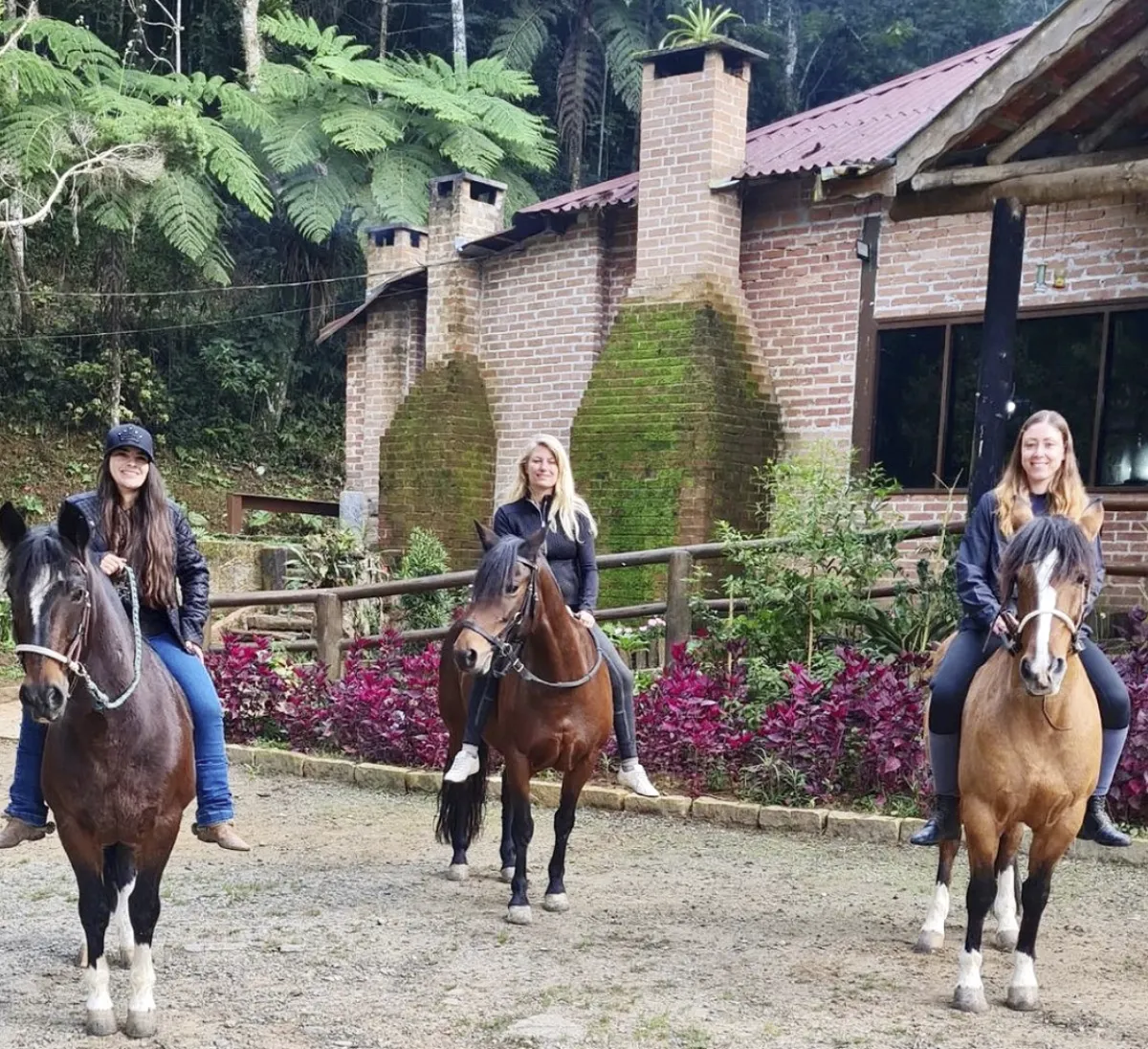
Luckily we also did clincs in other locations than the 'hipicas' near the city. We visited a private ranch in the mountains for almost a week and did a fantastic clinic there.

In spring 2023 WHC was visiting Brazil and doing clinics in the larger Sao Paolo area for the first time. Brazil is a very beautiful country and we got to meet so many nice people there - some will be friends for life!
Already in our first days in Sao Paolo we became aware that in Brazil many horses never have access to pastures. In most of the so-called 'hipicas' (large facilities with groomers for each horse and vets living on the places etc.) no pastures are available at all on the area.
The horses are confined in their stalls 24/7 and only gets out when the owner comes to ride the horse - maybe 2-3 hours per week. We hope that speaking up about it will somehow help make some changes in the future for horses I Brazil.
It was heart braking to see the horses standing alone in their stalls day in and day out - for years and years. Even though we were there to teach bitless training, this fact about Brazilian 'hipicas' is a much bigger problem than riding with a bit.
We chose to ask participants in clinics to stay longer on one clinic day and we talked about the importance pasture time. It was impossible to ignore the situation.
It is so common in Brazil to have horses in stalls all the time and also the owners of the 'hipicas' doesn't even have/own anymore free land to make pastures for the horses, even if they decided to. So not really very easy to change this situation for the horses, but things really must change, they must find other solutions.

In spring 2023 WHC was visiting Brazil and doing clinics in the larger Sao Paolo area for the first time. Brazil is a very beautiful country and we got to meet so many nice people there - some will be friends for life!
Already in our first days in Sao Paolo we became aware that in Brazil many horses never have access to pastures. In most of the so-called 'hipicas' (large facilities with groomers for each horse and vets living on the places etc.) no pastures are available at all on the area.
The horses are confined in their stalls 24/7 and only gets out when the owner comes to ride the horse - maybe 2-3 hours per week. We hope that speaking up about it will somehow help make some changes in the future for horses I Brazil.
It was heart braking to see the horses standing alone in their stalls day in and day out - for years and years. Even though we were there to teach bitless training, this fact about Brazilian 'hipicas' is a much bigger problem than riding with a bit.
We chose to ask participants in clinics to stay longer on one clinic day and we talked about the importance pasture time. It was impossible to ignore the situation.
It is so common in Brazil to have horses in stalls all the time and also the owners of the 'hipicas' doesn't even have/own anymore free land to make pastures for the horses, even if they decided to. So not really very easy to change this situation for the horses, but things really must change, they must find other solutions.
For countless reasons, it is absolutely essential that horses are given access to pasture. In their natural state, horses walk at least 25 kilometers every single day.
This constant movement stimulates their blood circulation, strengthens bones, muscles, tendons,
*^and joints, and supports balance, flexibility, and healthy tissues.
Equally important, horses are herd animals — they need social interaction with other horses. This is not optional, but fundamental to their well-being.
On my next trip to Brazil magic happened again. A participant with two horse understood the importance of pasture time and social behavior and decided to move both her horses from living in confinement stalls to another facility with large pastures - these horses will be much happier and healthier horses.


We were happy to see posts on our social media from the Brazilian vets - they were already engaged!

Luckily we also did clincs in other locations than the 'hipicas' near the city. We visited a private ranch in the mountains for almost a week and did a fantastic clinic there.
Beautiful Wild Horse Sanctuary in Brazil

Because I often write about the troubling Mustang situation in the U.S., I also want to share this inspiring example of a far more hopeful wild horse story from Brazil.
It matters to me not only to highlight the challenges wild horses face, but also the solutions that show what becomes possible when people choose protection over exploitation.
Here, about 25 wild herds live peacefully in a vast, protected landscape. Among them are Arabians, Quarter Horses, Spanish Horses, and Brazilian Mangalargas. Watching them thrive together offers real hope that wild horses can still have a future of freedom.
This sanctuary in Brazil represents one of the most successful approaches for safeguarding wild herds. The horses roam freely within a huge, fenced area, supported only with salt, minerals, and a large shaded shelter. Natural lakes provide fresh water — and even space to swim, play, and express their natural behaviors. Nothing is imposed on them; their lives are as close to wild as possible, with only minimal care to ensure well-being.
All of the horses here live together as one large community, side by side, in freedom. Their presence is a powerful reminder of the resilience and harmony that emerge when animals are given the space to simply be themselves.
I look forward to visiting again in January 2026 and sharing much more about this extraordinary place. Today, around 500 wild horses live here — a breathtaking sight and a source of inspiration for anyone who believes horses deserve the freedom to truly be horses.
Beautiful Wild Horse Sanctuary in Brazil

Because I often write about the troubling Mustang situation in the U.S., I also want to share this inspiring example of a far more hopeful wild horse story from Brazil.
It matters to me not only to highlight the challenges wild horses face, but also the solutions that show what becomes possible when people choose protection over exploitation.
Here, about 25 wild herds live peacefully in a vast, protected landscape. Among them are Arabians, Quarter Horses, Spanish Horses, and Brazilian Mangalargas. Watching them thrive together offers real hope that wild horses can still have a future of freedom.
This sanctuary in Brazil represents one of the most successful approaches for safeguarding wild herds. The horses roam freely within a huge, fenced area, supported only with salt, minerals, and a large shaded shelter. Natural lakes provide fresh water — and even space to swim, play, and express their natural behaviors. Nothing is imposed on them; their lives are as close to wild as possible, with only minimal care to ensure well-being.
All of the horses here live together as one large community, side by side, in freedom. Their presence is a powerful reminder of the resilience and harmony that emerge when animals are given the space to simply be themselves.
I look forward to visiting again in January 2026 and sharing much more about this extraordinary place. Today, around 500 wild horses live here — a breathtaking sight and a source of inspiration for anyone who believes horses deserve the freedom to truly be horses.
Beautiful Wild Horse Sanctuary in Brazil

Because I often write about the troubling Mustang situation in the U.S., I also want to share this inspiring example of a far more hopeful wild horse story from Brazil.
It matters to me not only to highlight the challenges wild horses face, but also the solutions that show what becomes possible when people choose protection over exploitation.
Here, about 25 wild herds live peacefully in a vast, protected landscape. Among them are Arabians, Quarter Horses, Spanish Horses, and Brazilian Mangalargas. Watching them thrive together offers real hope that wild horses can still have a future of freedom.
This sanctuary in Brazil represents one of the most successful approaches for safeguarding wild herds. The horses roam freely within a huge, fenced area, supported only with salt, minerals, and a large shaded shelter. Natural lakes provide fresh water — and even space to swim, play, and express their natural behaviors. Nothing is imposed on them; their lives are as close to wild as possible, with only minimal care to ensure well-being.
All of the horses here live together as one large community, side by side, in freedom. Their presence is a powerful reminder of the resilience and harmony that emerge when animals are given the space to simply be themselves.
I look forward to visiting again in January 2026 and sharing much more about this extraordinary place. Today, around 500 wild horses live here — a breathtaking sight and a source of inspiration for anyone who believes horses deserve the freedom to truly be horses.


